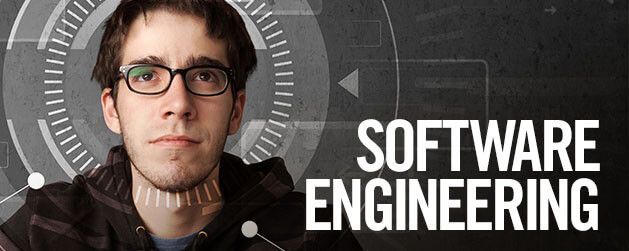
ABOUT UAT
University of Advancing Technology is an elite, private college that serves its student body by fostering knowledge creation and academic excellence in an environment that embraces the young technophiles of the world. With three centers of research and a suite of technology-centered undergraduate and graduate degrees, the University is a recognized leader in technology education.

Happy AI Appreciation Day—or as we like to call it at University of Advancing Technology (UAT), just another Friday. While the world’s still catching up to the power of artificial intelligence, our students are already training neural networks, debating AI ethics, and building the future—hands-on.
Artificial Intelligence isn’t some far-off fantasy. It’s the algorithm recommending your playlist, the assistant writing your emails, the engine behind smart cars and predictive diagnostics.
At UAT, our Artificial Intelligence degree teaches students to build, break, and rebuild smarter AI systems—hands-on.
Whether you’re:
You're not just learning about AI. You're learning how to shape what it becomes.
That’s how UAT Professor Tony Hinton opened one of the university’s most energizing internal AI sessions. His style? No lectures. No gatekeeping. Just real conversations about real technology—with people who love building it.
Professor Hinton, who teaches AI, Augmented Reality, and the Art of Computer Programming, is a former IBM engineer who’s been coding since 1980 and debugging legacy systems like a software archaeologist. His message to students is clear:
“If you want to be one of the people companies keep, learn AI.”
AI won’t replace people, but it will empower the ones who understand it.
AI won’t replace people, but it will amplify the ones who know how to use it.
And while Professor Hinton sets the tone, it’s our students who bring AI to life.
At UAT, Student Innovation Projects (SIPs) challenge students to turn bold ideas into real-world applications. Here’s how UAT students are using AI to solve problems, spark creativity, and push boundaries:
Developed by UAT grad Samael Newgate, this browser-based JavaScript application performs real-time facial analysis—detecting age, gender, and emotional expression using AI. It’s proof that powerful machine learning can run in everyday tech environments. 🔗 View the Project
Created by student Joe Parisia, this mobile app uses AI-driven collaborative filtering and location data to recommend live local music venues. By combining user preferences with map integration, The Underground helps users discover new artists and support local scenes. 🔗 Read More
Student Dylan Crockett designed this open-source platform to enable AI-powered communication across smart devices using WebSockets. The system detects when devices connect or disconnect and automates real-time messaging across various systems. 🔗 Explore IoT.IO
This 7-day AI sprint challenge brought students together to create a wide range of AI- and IoT-powered tools—from smart home assistants and pathfinding games to emotion-detecting bots and AI-powered graphical tools. 🔗 See the Winners
From day one, UAT students are encouraged to explore not just what AI can do—but what it should do.
In every course, students consider:
At UAT, the conversation is part of the curriculum.
Q: What can I do with an AI degree from UAT?
A: From developing apps to defending data systems, UAT grads work in game development, cybersecurity, robotics, and beyond.
Q: Is UAT’s AI program hands-on?
A: 100%. You’ll build projects, work with real tools, and even enter coding competitions.
Q: Does UAT teach ethical AI?
A: Yes—every AI student learns the importance of ethics, bias prevention, and responsible innovation.
AI is already reshaping every industry. The question is: Will you help shape it?
We’re not just preparing students for the future—we're preparing them to lead it.
Take the next step:
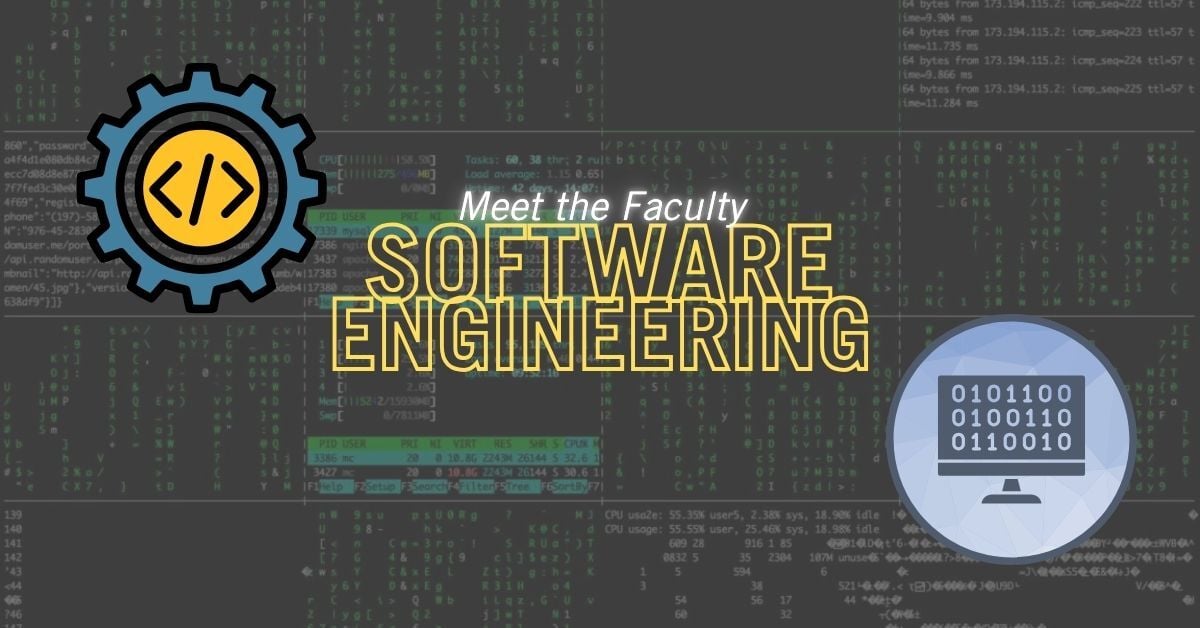
The University of Advancing Technology (UAT) boasts a cutting-edge Software Engineering faculty dedicated to fostering innovation and technical expertise in students. With a curriculum designed around real-world applications, agile methodologies, and industry-relevant coding practices, UAT’s faculty comprises experienced professionals who bring a blend of academic knowledge and real-world experience to the classroom. They emphasize collaborative development, software architecture, and artificial intelligence to prepare students for the ever-evolving tech landscape.
%20copy.gif)
Professor Rae Crusoe built her first website in ASP over 20 years ago as a Bachelor of Science in Computer Information Systems student at Arizona State University. She volunteered to reverse engineer a Perl website and took to the Internet to learn how to build the website and database. Professor Crusoe has a Master of Science degree in Information Management, also from Arizona State University. Rae has taught a number of IT courses online, along with developing websites in the banking, financial services, economic and non-profit fields. Professor Crusoe has seen the IT field change quite a bit from her first ASP website to today’s mobile development focus.
.gif)
Professor Rawad Habib has a Master of Science in Computer Science and a Bachelor of Science in Computer Engineering with an emphasis in Management Information Systems. Rawad also maintains certificates in FinTech and Blockchain Development and has participated in Ethereum Blockchain Developer Bookcamp with Solidity. Rawad has a strong background in Fullstack and Blockchain development.
Professor Hinton teaches Artificial Intelligence (AI), Augmented Reality, Mobile Application development, and the Art of Computer Programming. He has been writing code since 1980 and working as a Software Engineer since 1990. During his first quarter of a century as a software engineer and trainer at Fortune 100 companies in the U.S. and Europe, he had a behind-the-scenes seat determining how turning caffeine into code drives different industries.
Having worked almost 15 years at IBM for part of his career, he knows ancient technology such as UNIX, CP/M, DOS, and OS/2. One of his hobbies is software archeology and exorcisms on retro computing.
Other and more normal hobbies include traveling with family, practicing traditional martial arts, and MST3K.
He also has numerous industry certifications, including MCP, MCT, MCSE, and MCSD. Currently, he is earning his second master’s degree.

Mrs. Ashley J. McKinney is a data scientist, educator, and Ph.D. candidate in Health Outcomes Research at Saint Louis University. With over six years of experience in data science and analytics—following a strong foundation in pharmaceutical research and human performance—Ashley brings a multidisciplinary perspective to her role as a faculty member in the Data Science program at the University of Advancing Technology (UAT).
Prior to joining UAT, Ashley worked as a Research Data Analyst at Exos, where she applied advanced analytics and statistical modeling to evaluate health study outcomes and support high-performance human research initiatives. She also served at Pfizer as a Senior Associate Data Scientist and Associate Scientist, leading document automation efforts, validation protocols, and metadata systems for global data management.
Ashley’s technical expertise includes Python, R, SQL, STATA, Power BI, and Microsoft Excel, with specialized skills in data visualization, statistical computing, automation, and technical writing. She is committed to helping students build real-world competencies in data science by bridging rigorous research methods with innovative technology solutions.
Ashley holds a Master of Science in Health Data Science from Saint Louis University, a Biotechnology Certificate from St. Louis Community College, and a Bachelor of Arts in Biology from the University of Missouri–Columbia. She is currently pursuing her Ph.D. with a research focus on improving health outcomes through data-driven methodologies.
Learn more about UAT's Software Engineering Degrees Today!
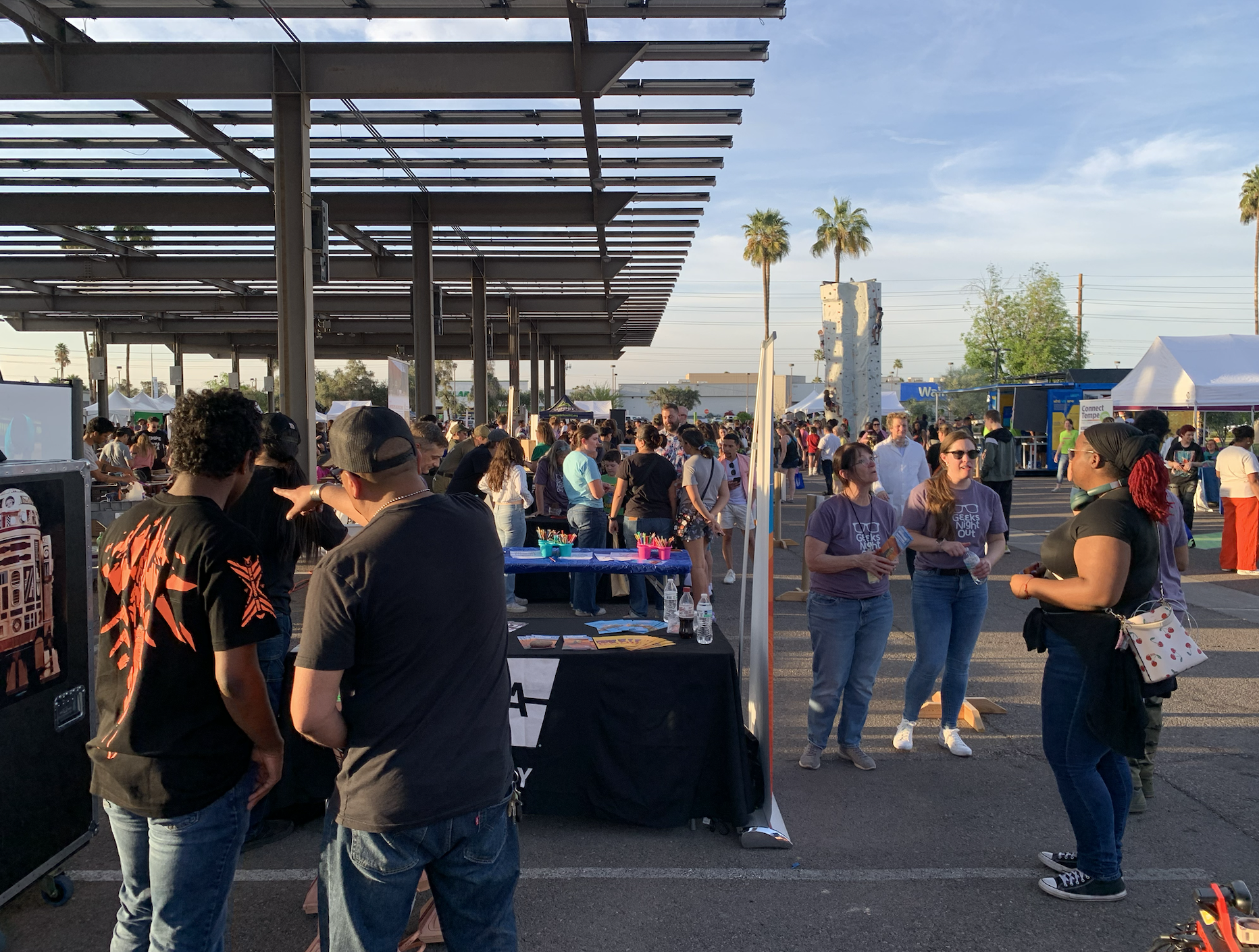
The University of Advancing Technology (UAT) was proud to participate in Tempe’s 12th annual STEAM Festival, Geeks Night Out, a signature event of the Arizona SciTech Festival.
Held in partnership with the City of Tempe and supported by organizations like State Farm and the Tempe Diablos, Geeks Night Out transformed the city into an interactive playground for learners of all ages. UAT joined more than 60 organizations in delivering engaging exhibits and activities, providing a firsthand look at the exciting intersections of technology and creativity.
At UAT’s booth, attendees had the opportunity to explore cutting-edge technology, including robotics, coding exercises, and virtual reality experiences. Our faculty and students engaged with curious minds, demonstrating how innovation shapes the future. Whether experimenting with AI, diving into game development, or learning about cybersecurity, visitors got a taste of what makes UAT a leader in advancing technology education. Community Partner, GenTech Support Inc accompanied UAT with their slew of their battle bots, gaming boxes and digital design displays.
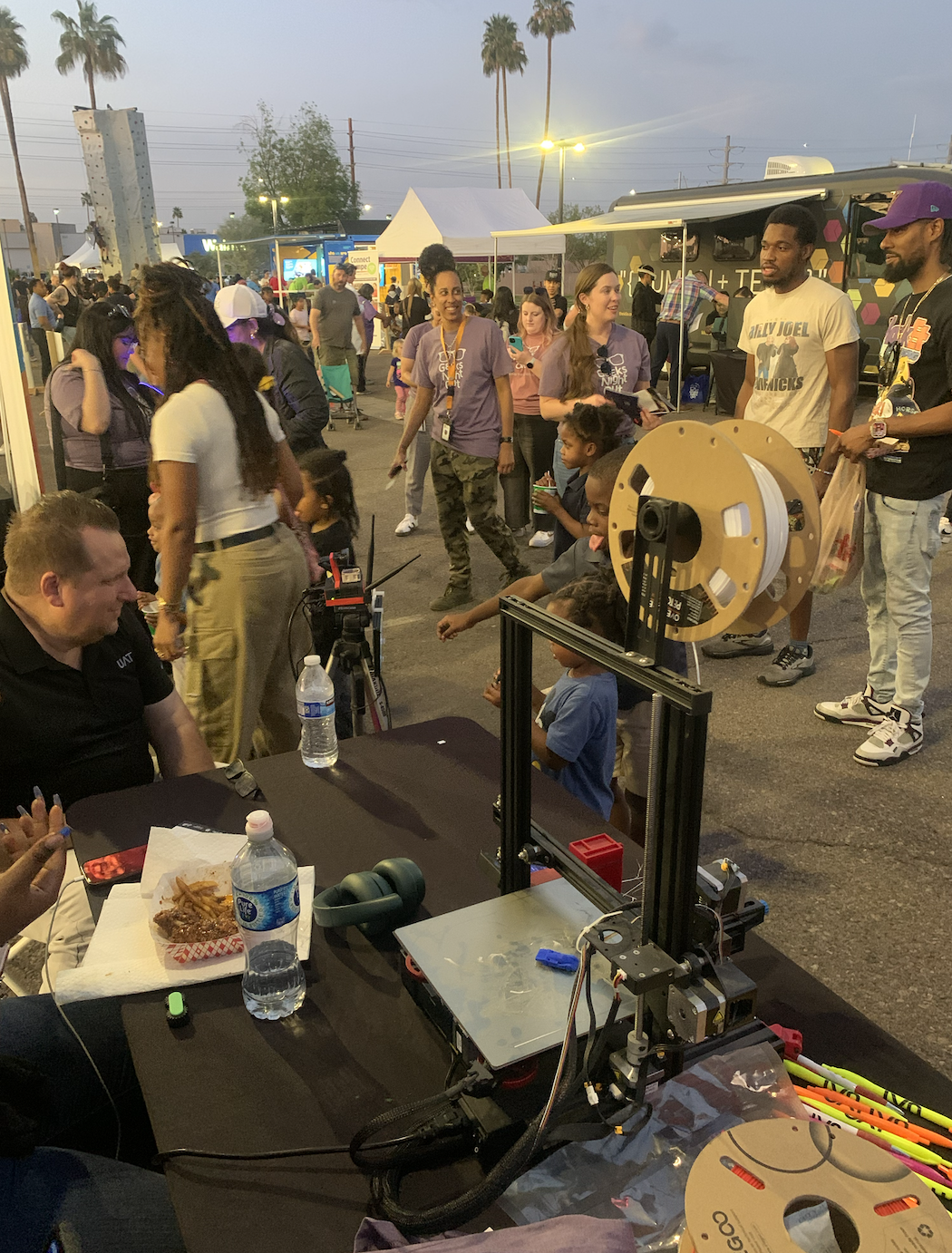
As an institution dedicated to fostering technology-driven education, UAT values opportunities like Geeks Night Out to connect with local schools, businesses, and fellow higher education institutions. The event’s collaborative spirit—bringing together Tempe Elementary School District, Tempe Union High School District, Kyrene School District, East Valley Institute of Technology (EVIT), Arizona State University, and Rio Salado College—reflects a shared commitment to preparing future innovators.
For those who visited our booth—thank you for geeking out with us! If you’re interested in UAT's upcoming Future Innovators Camp from June 23rd to 27th for students ages 6-16, click here for more information.
Follow Tempe Geeks Night Out on Facebook and Instagram to get excited for the event!

University of Advancing Technology (UAT) regularly hosts Virtual Open Houses, offering prospective students an invaluable opportunity to engage directly with the professors who will guide them through their academic journey. If you haven’t attended one yet, don’t worry—you’ll have another chance to experience what sets UAT apart at upcoming virtual open houses. Here’s a recap of what you can expect when you join us next time!
Our Virtual Open House offers a glimpse into UAT’s forward-thinking learning environment, whether you study online or on our technology-infused campus in Tempe, Arizona. At UAT, every assignment is tailored to your degree, emphasizing project-based learning and real-world application. With structured courses and dedicated student services, we ensure support from day one through graduation—and beyond, thanks to alumni benefits like auditing classes and career services.
The event's highlight is meeting UAT’s passionate professors, each bringing extensive industry experience into the classroom. Here’s a snapshot of the faculty that attended our last VOH:
Dr. Jill Coddington: From missile trajectory analysis to video game programming and international project management, Dr. Coddington’s classes in Advancing Computer Science (ACS) and Artificial Intelligence (AI) offer a wealth of real-world insights.
Professor Tony Hinton: An AI enthusiast, Professor Hinton integrates the latest tools and techniques into his curriculum, ensuring students are always working with current technologies.
Professor Rae Crusoe: Specializing in web design and programming, Professor Crusoe empowers students to channel their creativity into technical projects, such as interactive Mars Rover landing pages and AI-art galleries.
Professor Jael Battana: With a focus on Python, machine learning, and data visualization, Professor Battana's courses prepare students for careers as data scientists and analysts.
Professor Rawad Habib: A blockchain specialist, Professor Habib equips students with the knowledge to design and implement decentralized applications across diverse industries.
Professor Jake Perrine: Leading the Human-Computer Interaction (HCI) degree, Professor Perrine helps students design innovative user interfaces and products, bridging the gap between technology and human-centered design.
During the event, attendees explore the diverse degree offerings within UAT’s Software Engineering suite, including Advancing Computer Science, Artificial Intelligence, and graduate-level Software Engineering. Course highlights included:
UAT’s commitment to “learn by doing” was evident as students and faculty showcased real-world projects. From blockchain applications to AI-generated art, every course encourages students to innovate. This approach culminates in the Student Innovation Project (SIP), a capstone experience designed to challenge students to create, iterate, and showcase their groundbreaking ideas.
Inspired by what you’ve read? Don’t miss the chance to meet our faculty, explore our degrees, and see firsthand how UAT fosters innovation and excellence. Mark your calendars for our next Virtual Open House and take the first step toward transforming your future.
Your future in advancing technology starts here!
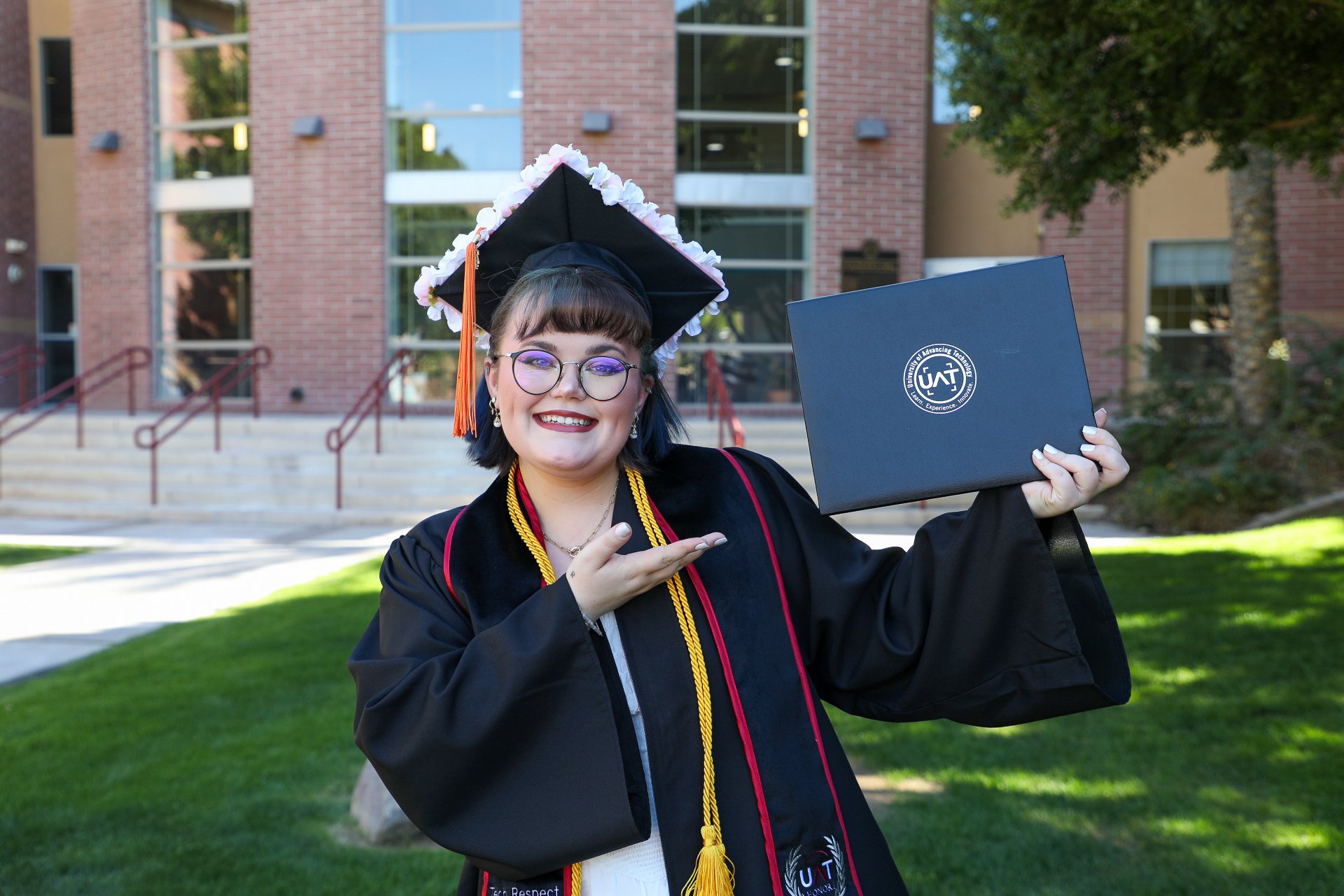
On the sixth day of Techmas, we’re spotlighting the six-degree suites at University of Advancing Technology (UAT). These distinct yet interconnected areas of study define the innovative, hands-on educational experience that sets UAT apart. With a focus on preparing students for the careers of tomorrow, each suite is tailored to explore cutting-edge technologies, foster creativity, and develop expertise in fast-growing industries.
If you’re drawn to building, designing, and imagining futuristic solutions, the Creation & Simulation suite is your calling. From Digital Maker and Fabrication to Robotics and Embedded Systems and Human Computer Interaction, these degrees empower students to bring ideas to life, pushing the boundaries of technology and usability.
Ranked #1 in Computer Science in Arizona, UAT’s Software Engineering family develops leaders in technology through degrees in Advancing Computer Science, Artificial Intelligence, Data Science, and a Master’s in Software Engineering. Students master coding, machine learning, and the art of problem-solving, preparing to innovate in fields that drive the digital world.
The Cybersecurity suite offers cutting-edge degrees in Network Engineering, Network Security, Technology Forensics, and a Master’s in Cyber Security, arming students with the skills to protect systems and data from cyber threats. UAT graduates are highly sought after in this ever-evolving industry, where demand for cybersecurity expertise continues to rise.
For creative minds, the Digital Arts suite offers degrees in Advertising Art, Digital Marketing, and Digital Video. These programs blend artistic expression with technical expertise, preparing students for dynamic careers in media, branding, and content creation.
The Game Studies suite immerses students in the world of interactive entertainment. With degrees in Game Art and Animation, Game Design, Game Programming, and a Master's in Game Production and Management, UAT cultivates the next generation of game developers ready to shape this billion-dollar industry.
Future leaders find their niche in the Business & Innovation suite, featuring degrees in Business Technology, Technology Studies, and Master's degrees in Technology Innovation and Technology Leadership. These programs combine entrepreneurial thinking with technical skills, equipping students to drive change in tech-driven industries.
As UAT celebrates innovation this Techmas season, these six degree suites highlight the diversity and depth of education that UAT provides—ensuring every student has the tools to thrive in the tech careers of the future.
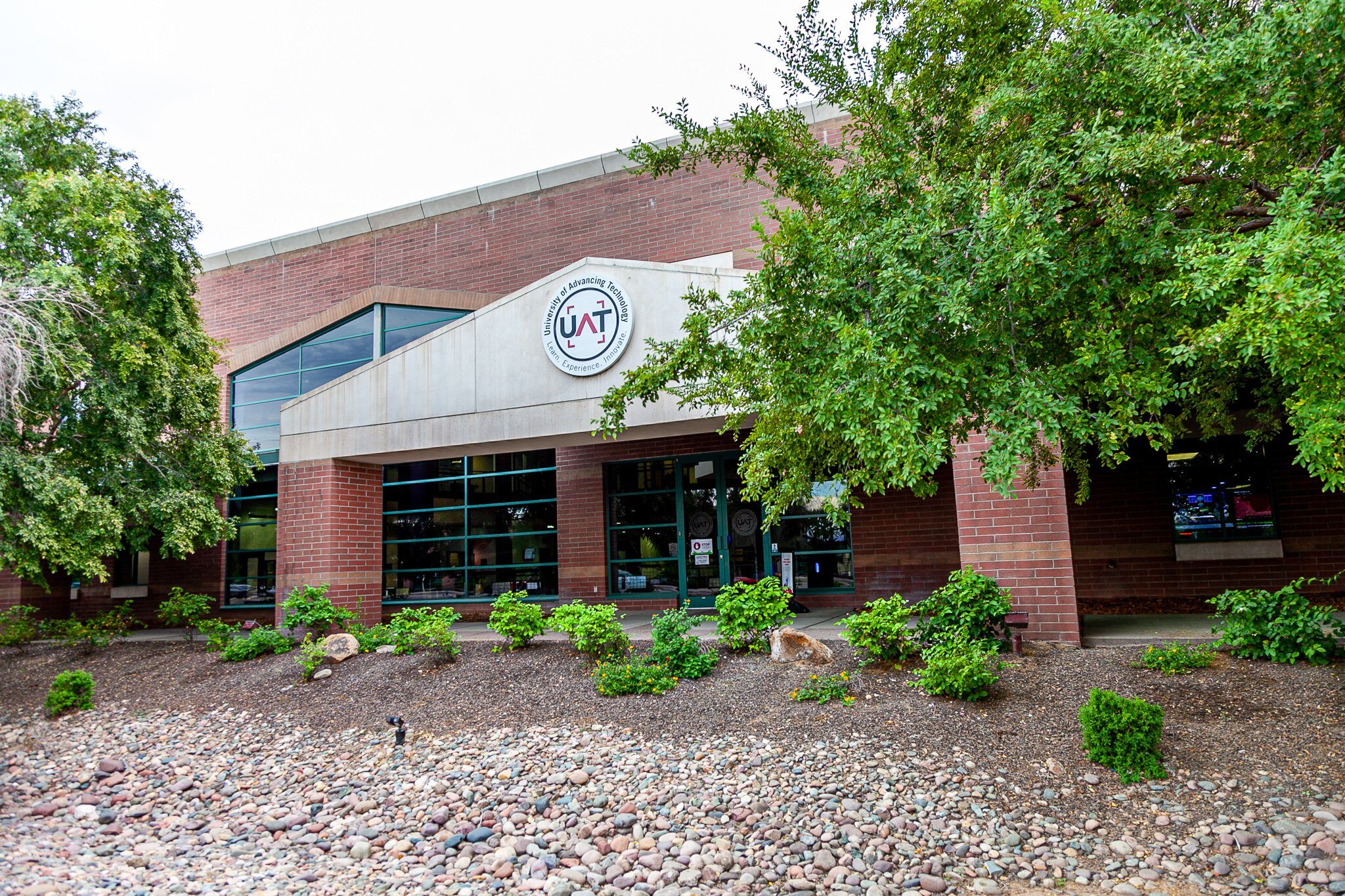
University of Advancing Technology (UAT) has been ranked the #1 Best College for Computer Science in Arizona by NICHE for the second year in a row. NICHE is a trusted platform that provides detailed rankings of colleges, and insights on educational institutions based on performance, student reviews, and other key factors. This achievement reinforces UAT's commitment to excelling and innovating in the ever-evolving field of computer science.
UAT offers a Bachelor of Science degree in Advancing Computer Science alongside two additional Bachelor's degrees and a Master of Science degree in the Software Engineering degree family.
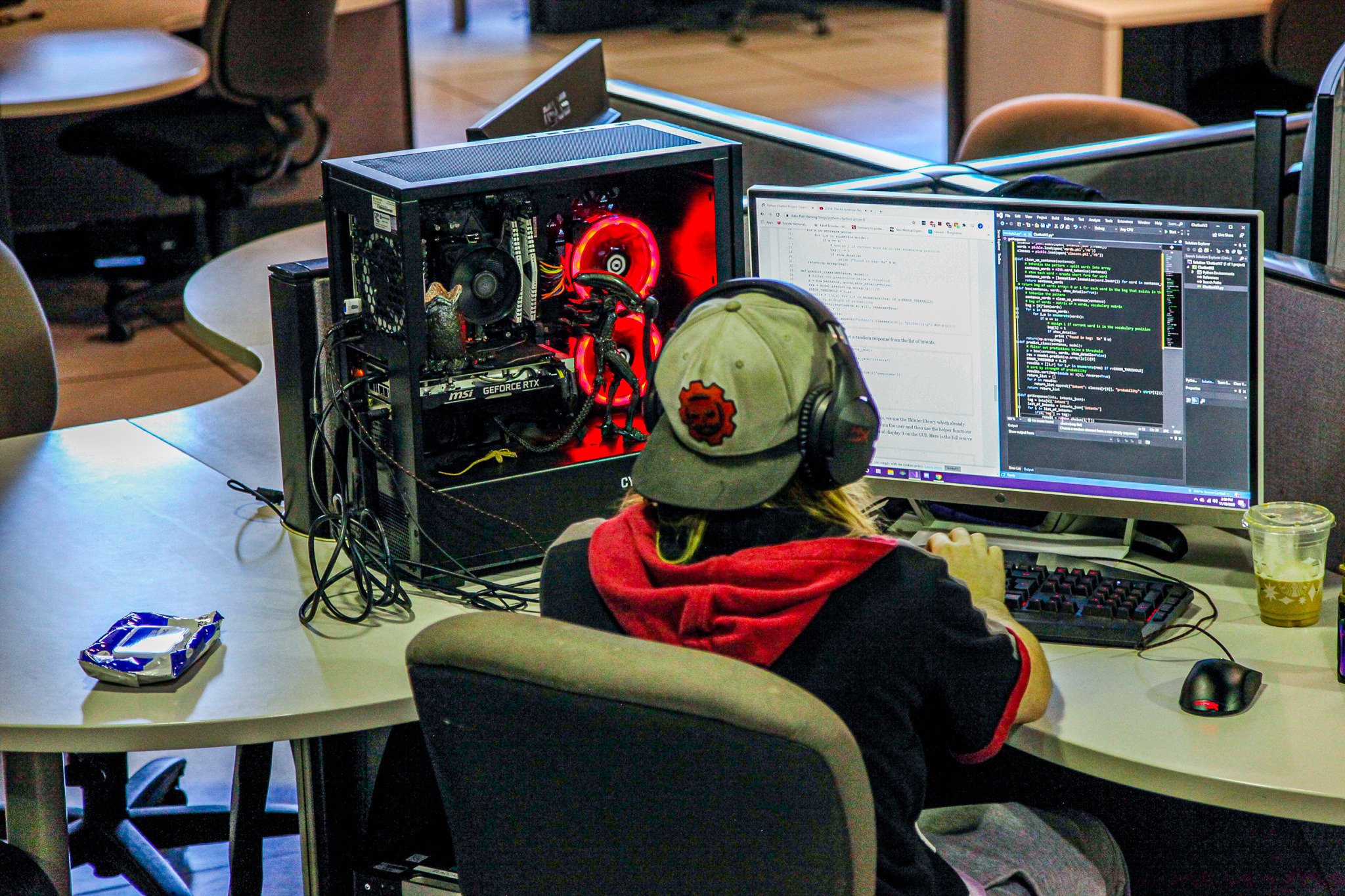
Advancing Computer Science - This degree focuses on both the technical and design aspects of programming. It prepares students to handle a range of programming languages including Javascript and C++, as well as frameworks and platforms, including mobile systems.
Artificial Intelligence - This degree dives into the creation of AI tools that mimic human thinking, pattern recognition, and decision-making. It covers AI concepts, including natural language processing, machine learning, and deep learning. Students are prepared for practical AI applications in areas like autonomous vehicles and big data analysis by involving them in real-world projects and utilizing core programming languages and platforms.
Data Science - This degree equips students with skills to handle and interpret real-time data from various sources, such as IoT, weather, and organizational operations. The Data Science degree focuses on coding for data interaction and presentation, enabling students to extract valuable insights and communicate them effectively.
Software Engineering (MS) - This elite Master of Science degree is designed for working technology professionals seeking to advance their careers. UAT's graduate degrees remove traditional barriers to education, enabling students to earn top credentials and make a significant impact in the tech field. UAT's graduate education fosters an environment of intellectual growth and innovation, helping students develop critical evaluation skills and explore new areas of inquiry.
Interested in learning more? Discover why UAT is ranked a #1 Best College for Computer Science by requesting information or applying for acceptance today! It's fast and there is no application fee.

In the dynamic halls of the University of Advancing Technology (UAT), the Spring 2024 semester witnessed a wave of inventive projects from students immersed in the software engineering realm. Among these pioneering endeavors, the Student Innovation Projects (SIP) shone brightly, reflecting the innovative spirit that defines the institution's culture.
At the forefront of innovation stands John Kidd, an Advancing Computer Science major, whose project "Portal Ops" promises to redefine our digital interactions. With a fusion of technical expertise and imaginative flair, Kidd's creation introduces a world where virtual portals seamlessly integrate into our daily lives. "Portal Ops" holds the potential to revolutionize communication, collaboration, and exploration in the digital landscape.
Antione Darville emerges as a trailblazer in the field of Artificial Intelligence with his project "Project Delta." Delving into the depths of AI technology, Darville's creation represents a monumental leap forward. Through meticulous research and innovative algorithms, "Project Delta" showcases an AI system capable of adaptive evolution, paving the way for smarter, more responsive technologies that adapt to their environment.
Rachael Savage invites us into a whimsical world of storytelling and AI with her project "WhimsiTale." With a blend of creativity and technical prowess, Savage crafts an interactive narrative experience where AI-driven characters lead users on fantastical adventures. "WhimsiTale" not only showcases the capabilities of AI but also demonstrates its potential to enhance storytelling and immersive experiences.
Robert Solis ventures into the realm of fitness and wellness with his project "AI Fit Fusion." Leveraging the power of AI, Solis aims to revolutionize the fitness industry by offering personalized workout routines and nutritional plans tailored to individual needs. With "AI Fit Fusion," Solis seeks to empower users to achieve their fitness goals efficiently and effectively, showcasing the transformative potential of AI in everyday life.
These projects, born from the creative minds of UAT students, epitomize the university's dedication to fostering innovation and pushing technological boundaries. As graduates like John Kidd, Antione Darville, Rachael Savage, and Robert Solis transition into the workforce, they carry with them not just a degree, but a legacy of creativity, ingenuity, and a relentless pursuit of excellence. Their SIPs stand as testaments to their talent and commitment, laying the groundwork for a future where technology knows no bounds.
Learn more about how Student Innovation Projects contribute to career readiness, here.
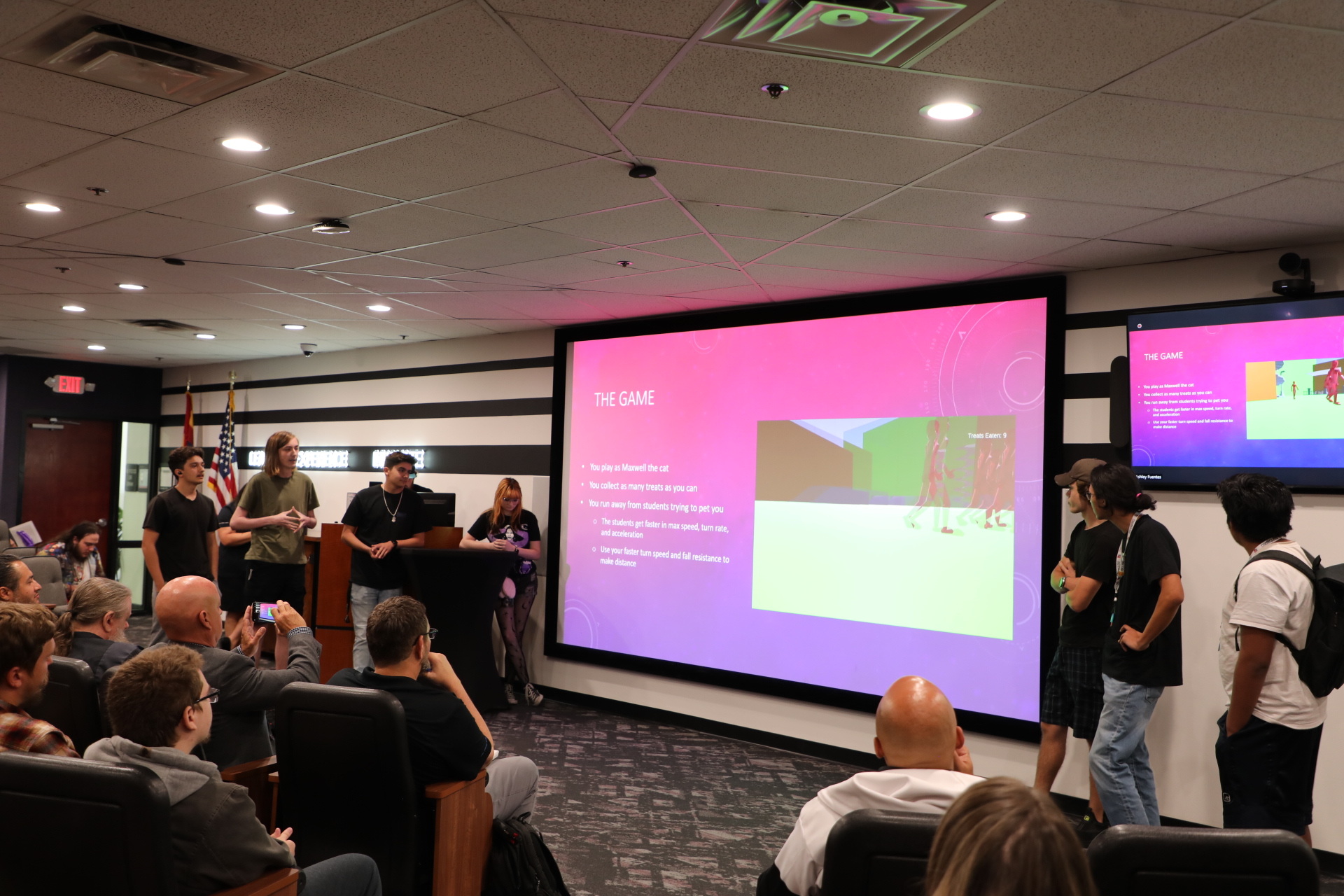
University of Advancing Technology (UAT) offers a unique differentiator for its students called Production Studios, a class designed to create a real world, industry project experience.
"The UAT Production Studio course allows students to learn and apply the steps, practices, and processes linked to technology project creation. Through the class, students take on the roles and procedures of teams working in production pipelines that mirror the workplace,” says Derric Clark.
Clark is UAT's Game Studies Program Chair and has been an integral part of UAT Production Studio since its conception and has significantly influenced its evolution to where it is today. Clark currently runs the curriculum and class for Production Studios for all UAT students.
T. Lynn Understiller, UAT Professor for the Game Art and Animation and the graduate courses for the Game Production and Management master's degree, was also an integral pioneer for UAT Production Studios, launching it as UAT Game Studios in 2011 and offered to only game studies majors at the time.
Understiller stated, “UAT’s Production Studios has led students through the job process beginning each semester with the Game Job Fair where students are recruited onto Greenlighted team projects and take on owning and managing their teams on their own while working with professional outside stakeholders. UAT Studios has become one of the University’s greatest assets and has been adopted by all programs of study.”
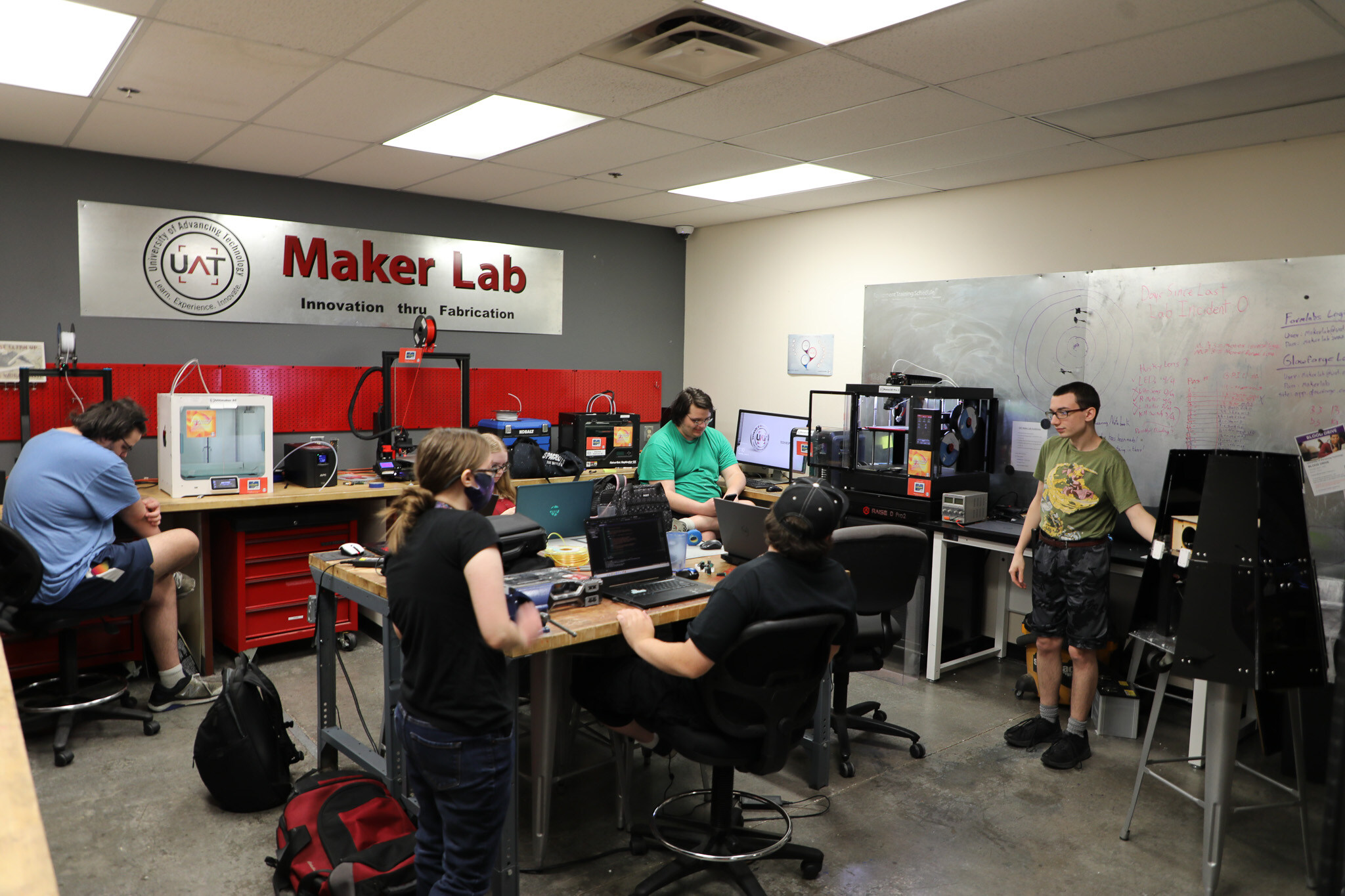
Following each semester’s Student Awards Ceremony, an event called ‘Greenlight’ takes place where students and external industry clients can pitch projects to become teams for the following semester’s Production Studios class. Projects can be in any stage of development, from idea to fully functioning business, such as Grab The Axe and FABRIC.
For Greenlight, any UAT students have the opportunity to pitch and manage their projects, as well as engage with external projects involving real clients and diverse personalities. They often are able to have a graduate student on their team to help with project management, or interact with alumni who contribute to the studio enhances networking opportunities. Additionally, the class mimics an incubator for launching companies, empowering students to hire interns and further contribute to the industry. Overall, Production Studios not only inspires students but also serves as a technology nexus connecting various UAT classes, enriching the educational experience and culture for all students.
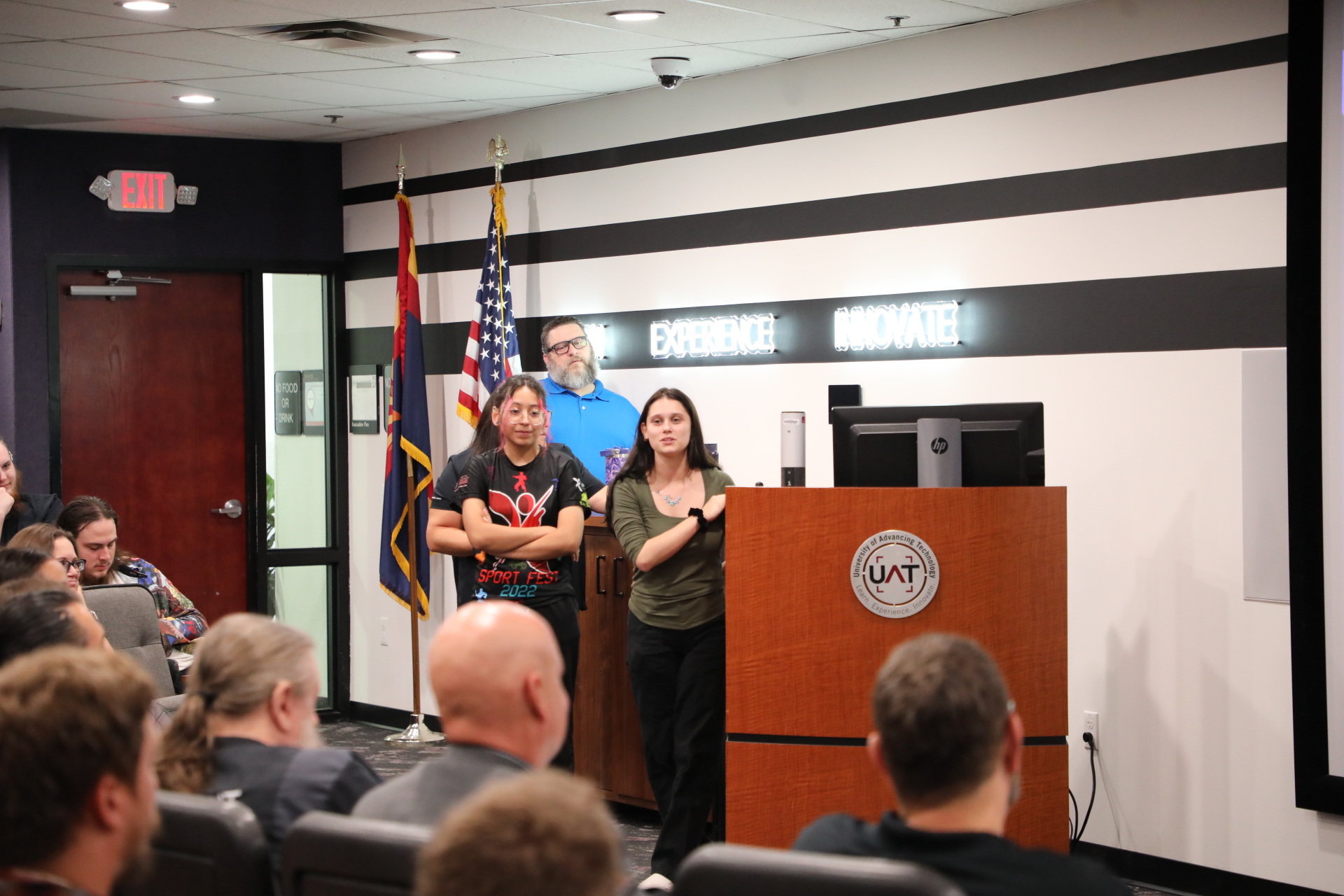
The Production Studios class at UAT offers a comprehensive array of benefits for students. Through this course, students not only create high-quality completed works but also develop expertise in production and discipline. By collaborating with teams, they witness the fruition of a collective vision, gaining valuable experience in team leadership and mentorship. The class experience facilitates collaboration between online and on-ground students, fostering a dynamic learning environment. Moreover, students are immersed in real-world industry expectations, honing both soft and hard skills essential for success.
Students are required to take at least two sessions or semesters of Production Studio and in each, they work toward the creation of market-ready, professional applications of technology. This class typically is part of a UAT student’s curriculum in the final four semesters, alongside Student Innovation Project (SIP), Internship, Boards and Portfolio courses. All classes combined pull together the culmination of a student’s unique accolades and achievements, readying them to be able to present and articulate their skills to the world.
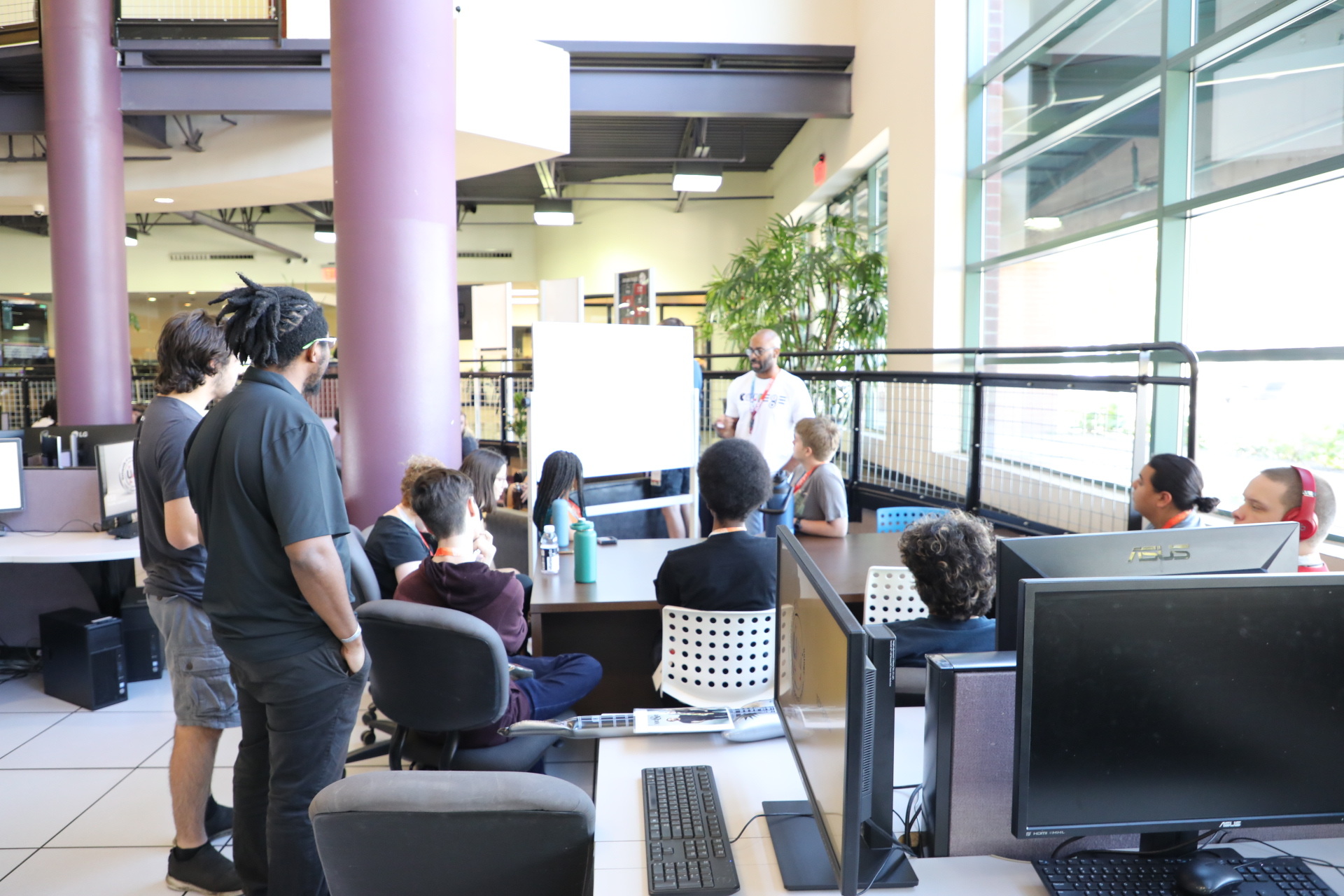
Major components and priorities of the UAT Production Studios course include: working together as a team to accomplish completed works, creating opportunities for students to demonstrate mastery for their chosen fields, have industry-relevant projects Portfolio Works to showcase to the industry and prospective employers, as well as create innovative projects for the industry that solve real-world problems.
Course objectives for UAT Production Studios includes:
• Collaborate with all team members to develop a project and progress it to the next major milestone.
• Design and implementation of all necessary features, functions, and assets.
• Develop cross-disciplinary and leadership skills using industry-standard management systems and tools, team, and project management techniques which includes interfacing with external QA teams, and creating supporting documentation that provides detailed specifications of all features and content, as well as a record of the project’s development.
• Project’s progress is presented at the end of the semester.
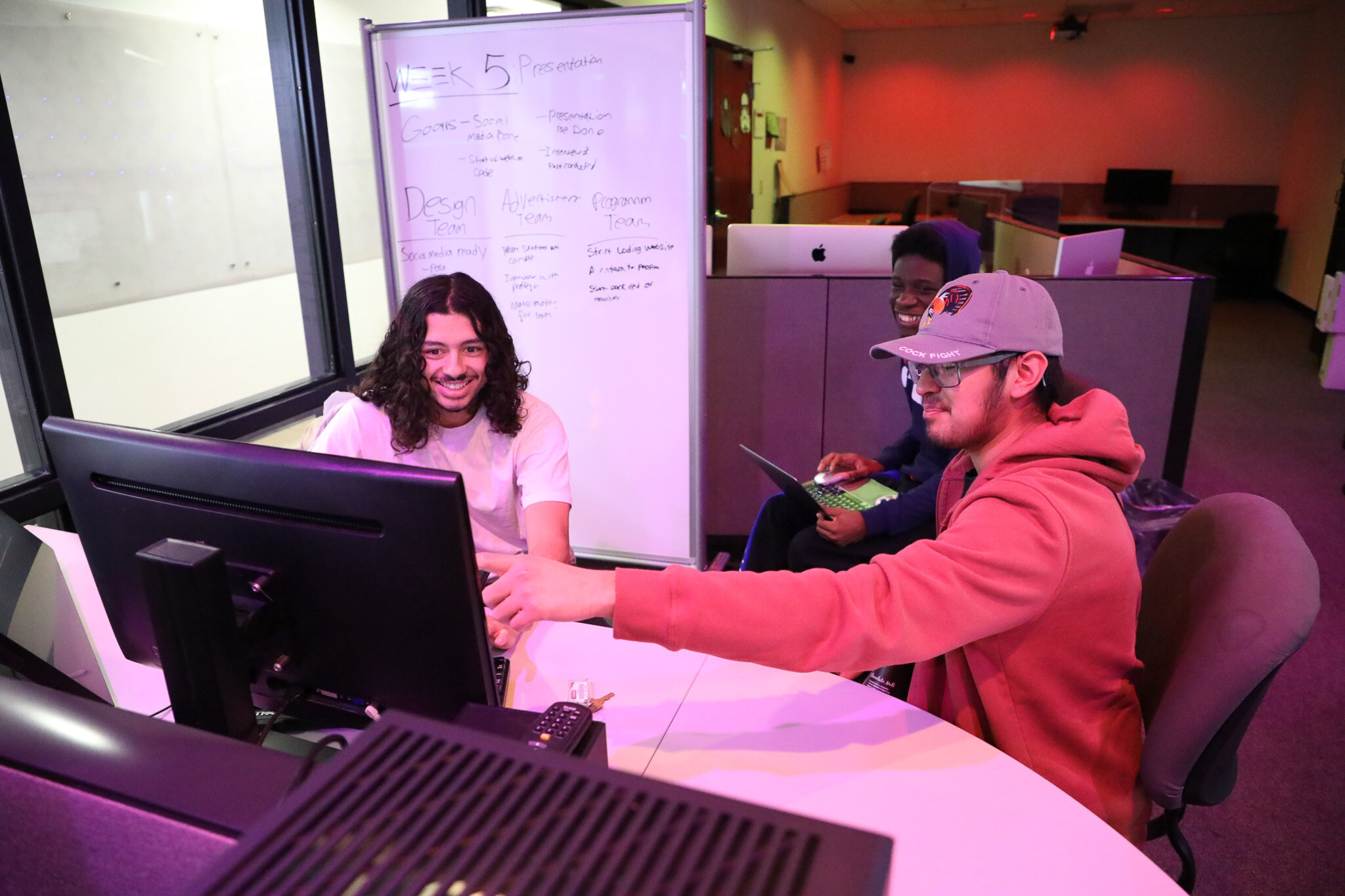
Alexis Sloan, UAT Network Security Alum and Brooke Cayce Scholarship award winner ran her Student Innovation Project (SIP), STEM For Kiddos, for 3 semesters through Production Studios during her undergraduate time at UAT.
“I enjoy the hands on experience we are able to get in the class no matter what your major is you’re going to get something out of it. I think with the leadership aspect of being in the class, I have learned a lot from how to manage a team, delegate tasks among others, and overall time management skills. Everyone will say communication is the number one thing to have but I also think that the organization through the project is also a major role. It has helped me find ways I work better with a team and how to grow within a team,” says Sloan.
Sloan is continuing her education with a Master of Science in Technology Leadership at UAT. She hopes to continue running her project through Production Studios to provide a great opportunity for the UAT undergraduate students to work on a matured, vibrant, and fun student project.
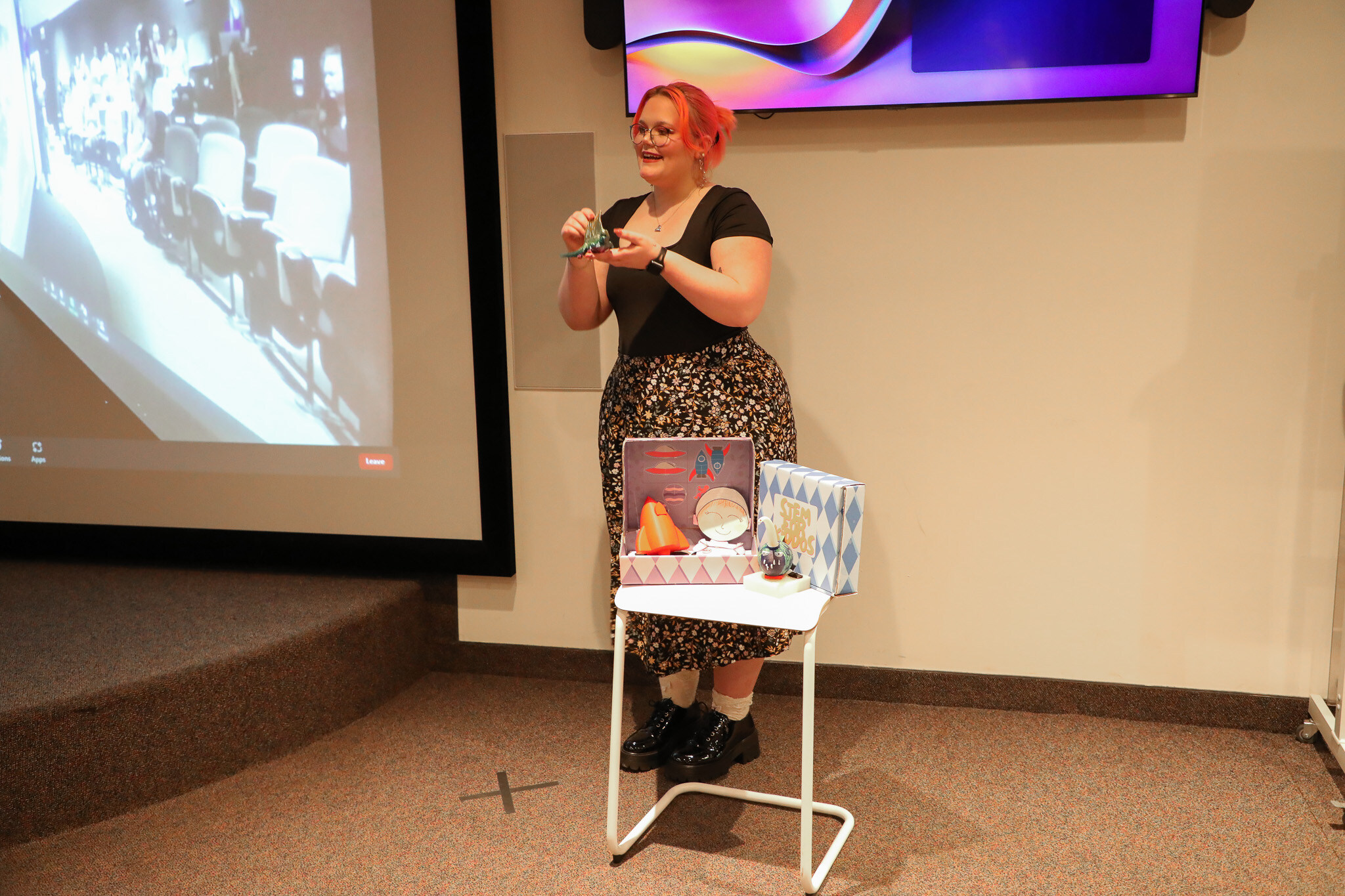
Echoing Sloan's sentiments, Stace Dixon, a UAT Digital Marketing degree alum who ran her SIP, the GENkids app through Production Studios in the Fall semester stated, “Production Studios is comparable to and works parallel to UAT’s Internship experience. Students are getting exposure to what it's like to work in the real world, facing the same challenges organizations deal with every day. I've also seen student projects launch careers if they continue pursuing it after Studios, like Escape Room AR. Production Studios is a unique, foundational, and transformative experience for UAT students to sharpen their career readiness and leadership skills, readying them for the challenges they will face in their future careers."
Discover more about Production Studios and other unique and cool courses in UAT’s Course Catalog.
If you’re ready to take the next step toward a degree and Tech Respect, apply today or schedule a meeting with your Academic Advisor to begin your enrollment process.

Team Member: Joe Parisia Advancing Computer Science (ACS), Artificial Intelligence (AI)
It’s Saturday night and you don’t have plans. You and your friends love live music but are overwhelmed with options… and can’t agree on which event, venue or even band will be the most fun. The solution? The Underground.
The Underground is a mobile app that uses your location to recommend venues and events near you and suggest new bands based on what you already like. With the sheer number of social media platforms, it’s hard to decide where to go when looking for shows, especially when so many events are constantly thrown in your face. Created by Joe Parisia, an ACS and AI major, the idea for the app started in order to fulfill his own needs.
“I wanted a way for people to find something they’d already like without having to go through and listen to a bunch of bands they haven’t heard of before just to find something they’d like to go to.”
New users are prompted to enter a handful of their favorite bands, which are added to a database when first signing into the app. Similar to how Amazon recommends new products, the app uses a collaborative filtering algorithm to suggest bands and new events you might like based on the database of your unique music tastes. The app relies on Google Maps for location to recommend venues near you. The Underground takes the hard part out of finding what you want to do on any given night by presenting you with options.
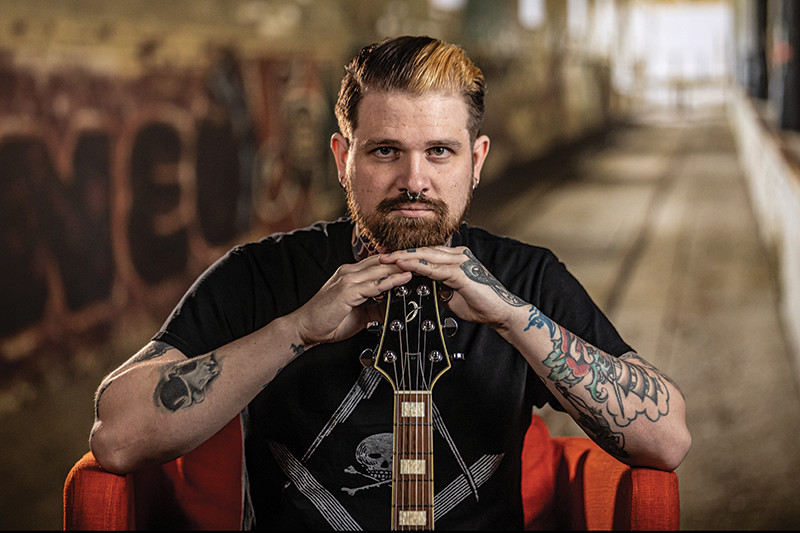
Joe was initially having a hard time brainstorming an idea for his Student Innovation Project (SIP), then the real-world scenario that inspired the app happened. Invited to a bunch of events with only time to attend one, Joe decided to make an app that would make the call for him.
When initially diving into the project, it was a completely different app. Over time, the app was slowly molded into what it is today by showing the app to bandmates and friends at shows, who offered valuable recommendations and insights into actual use cases.
There are many resources for popular mainstream bands, but it’s harder for smaller bands to get noticed, even when they’re really talented. While the app changed, Joe’s goals for the project never did, which were “to really bring smaller, local acts to the light and enable people to find them without cycling through an endless number of other bands.”
As a band member of TV TRAGEDY, Joe already had a lot of material for the app. “It’s just one of my passions. It helped the whole process because it’s something I really care about and have been involved with for a long time. Instead of building an app that I don’t have a connection to, I’d say my band is probably the main reason I kept going with the concept of The Underground instead of pursuing something else.”
Local to the Phoenix area, Joe plays guitar for TV TRAGEDY, a ‘90s-style punk band that plays faster, heavier music. Going on 10 years of being in a band, they have a new lineup of bandmates consisting of five members.
“We’ve been playing out of town all year, we haven’t played in town yet, about 12-13 shows so far. We already have a couple more mini tours that are being booked right now. It’s been pretty fun!”
Joe enlisted a couple professors to help with coding issues, and he also had help from another UAT student, Michael Hinsberger (ACS), who assisted in ironing out the recommendation system. Joe states, “Fun fact, I never touched any programming before coming to UAT. I always just played around on computers, like in the Myspace days with HTML. I learned everything for this app here, except for Photoshop skills. I made all the assets on the app.”
Now that his SIP is completed, Joe is looking for help finishing the app to bring it to market. Up until this point, the project has been running locally on Joe’s personal computer, but it’s now at the point where dedicated servers are needed. “I would love for the app to be released and utilized by anyone.”
As a recent graduate of UAT, Joe has community aspirations, “I want to find a job where I can use my skills to help people, I’ve always liked volunteering whenever I can. And to use my skills to create apps or programs to help the community, that’s always been the end goal.”
Collaborators:
Micheal Hinsberger, Advancing Computer Science
If this has sparked your interest, it's the perfect time to requested information or apply for acceptance to UAT. Our friendly Admissions and Financial Aid Advisors can support you in the process of figuring out if an Advancing Computer Science degree is right for you. Take the next steps toward your future earning #TechRespect and reach out today!
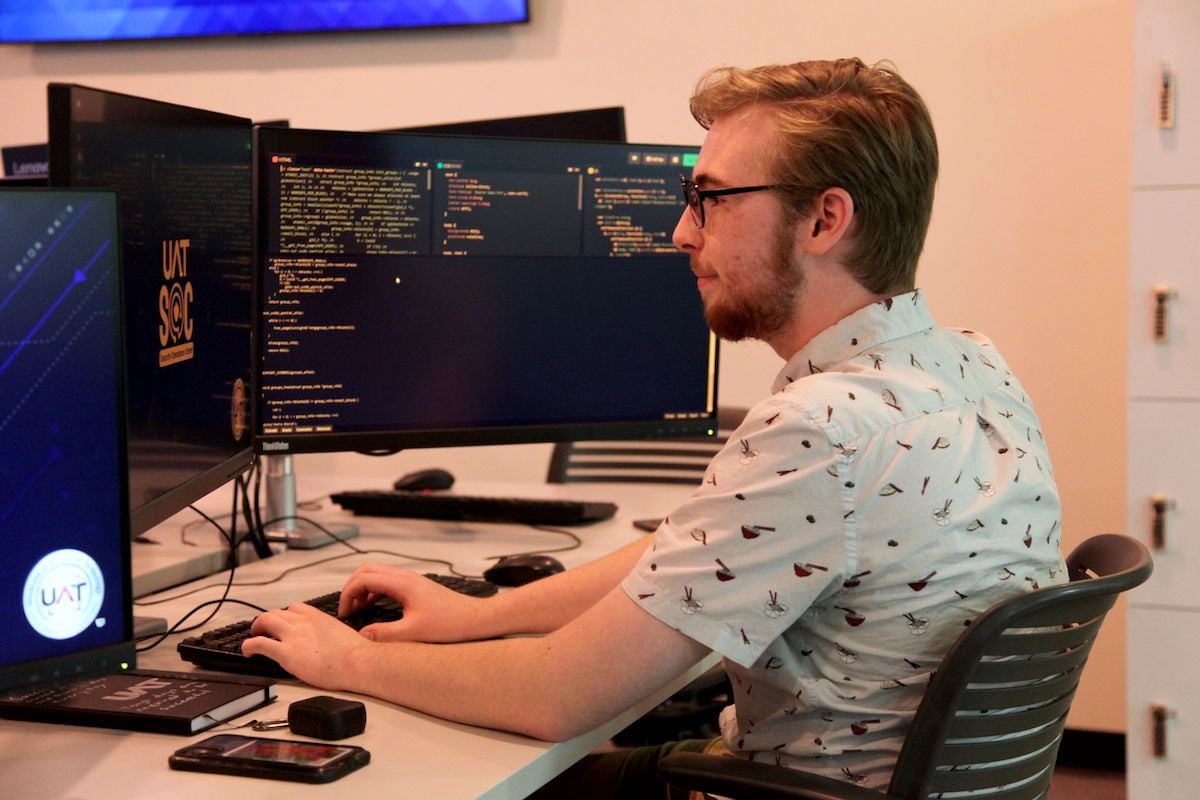
Are you excited by the thought of being able to create an app, learn the intricacies of your favorite social media algorithms, or write code and develop software? These are just a handful of the incredible opportunities a University of Advancing Technology (UAT) Bachelor of Science in Advancing Computer Science can award you.
There's a reason Advancing Computer Science and Software Engineering are two of the most popular degrees of interest for incoming undergraduate and graduate students. The University's (UAT) family of Software Engineering degrees gives students valuable software development, design, and programming skills that can set them up for the potential of a lucrative career in comparison to other fields and especially non-technical disciplines.
The Advancing Computer Science degree, for example, covers a myriad of essential information to prepare students for whatever computer science career they choose. The program prides itself in its wealth of computer science information and experience, as well as its ability to transfer skills from the computer to the real world. A bachelor’s in Advancing Computer Science or a master's in Software Engineering also looks stellar on a resume. It demonstrates to employers that you are well-versed and capable in many increasingly popular technological areas.
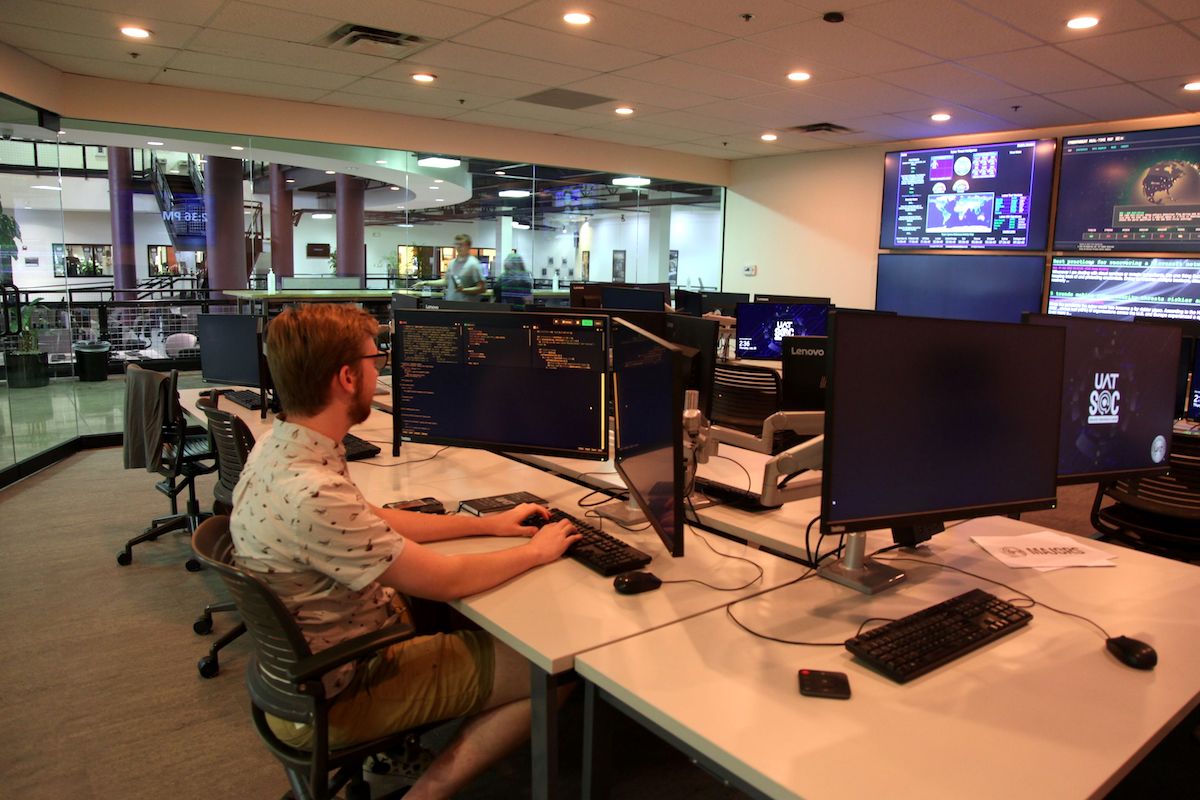
UAT Student, Tyler Prettyman working on a programming project in UAT's Security Operations Center.
A Bachelor of Science in Advancing Computer Science should appeal to students with an interest in fields of science, technology, engineering, and math; together a term better known as STEM fields. That is because the program envelopes all of these skills into one degree to prepare a student for a wide variety of careers across all industries and verticals.
Because the program is so comprehensive, it can be a challenging endeavor for several people. However, it is extremely worthwhile for the same reason. An Advancing Computer Science degree opens students up to several career opportunities to give them flexibility and freedom when it comes time to enter their preferred workforce. It is a difficult degree that requires a passion for math, problem-solving, and computer science as a whole. If that sounds like you, this program may be a perfect fit! It may also interest individuals looking to further their software development skills and receive an understanding of multiple different frameworks and platforms.
Also, computer science is for everyone, regardless of gender or ethnicity. However, it has become known to be a white, male-dominated industry. This may sound discouraging, but it is actually why more minorities should feel encouraged to step into this program and why UAT emphasizes diversity within its culture and education. Not only is it essential to break up this discriminatory trend, but to provide unique experiences, perspectives and diversity of thought that have been historically lacking in less-diverse corporations.
According to Dr. Jill Coddington, a UAT Advancing Computer Science Professor and real-world Rocket Scientist, this program is a good fit for anybody with a passion for the subject matter.
“You spend more time in your life at your job than anything else other than sleeping,” she said. “That’s why you’ve got to love tech so you can enjoy your job. Notice I mentioned passion, not skills. UAT can teach you the skills. You just need to know that this is what you enjoy.”
.jpg)
UAT Professor, Dr. Jill Coddington teaches Data Science, Computer Science, Artificial Intelligence, Software Engineering, Robotics and leads the UAT Space Club and courses.
"Once you have one skill, you can build upon it and make something even more amazing." - Dr. Jill Coddington.
As you're researching, you'll find that requirements and courses differentiate among colleges and universities throughout the US, and may not be as adaptable as quickly as the industry demands. Meanwhile, Courses for an Advancing Computer Science Degree at The University of Advancing Technology are specifically curated to broach both broad and emerging subjects in order to be eventually narrowed down to meet a student’s specific interests.
As a whole, the degree is based on the idea of doing. This includes projects and real-world experiential learning so that graduates are prepared to adapt, evolve and innovate along with technology. This concept actually applies to all degrees UAT offers.
As Coddington explained it, “The UAT journey for an Advancing Computer Science major at UAT looks like – PROJECTS! Seriously, UAT teaches through doing, creating, and demonstrating. Starting in the very first programming class, you will make a significant project. Another aspect of the ACS degree is that we apply the concepts of Legos. Legos are building blocks of skills. Once you have one skill, you can build upon it and make something even more amazing."
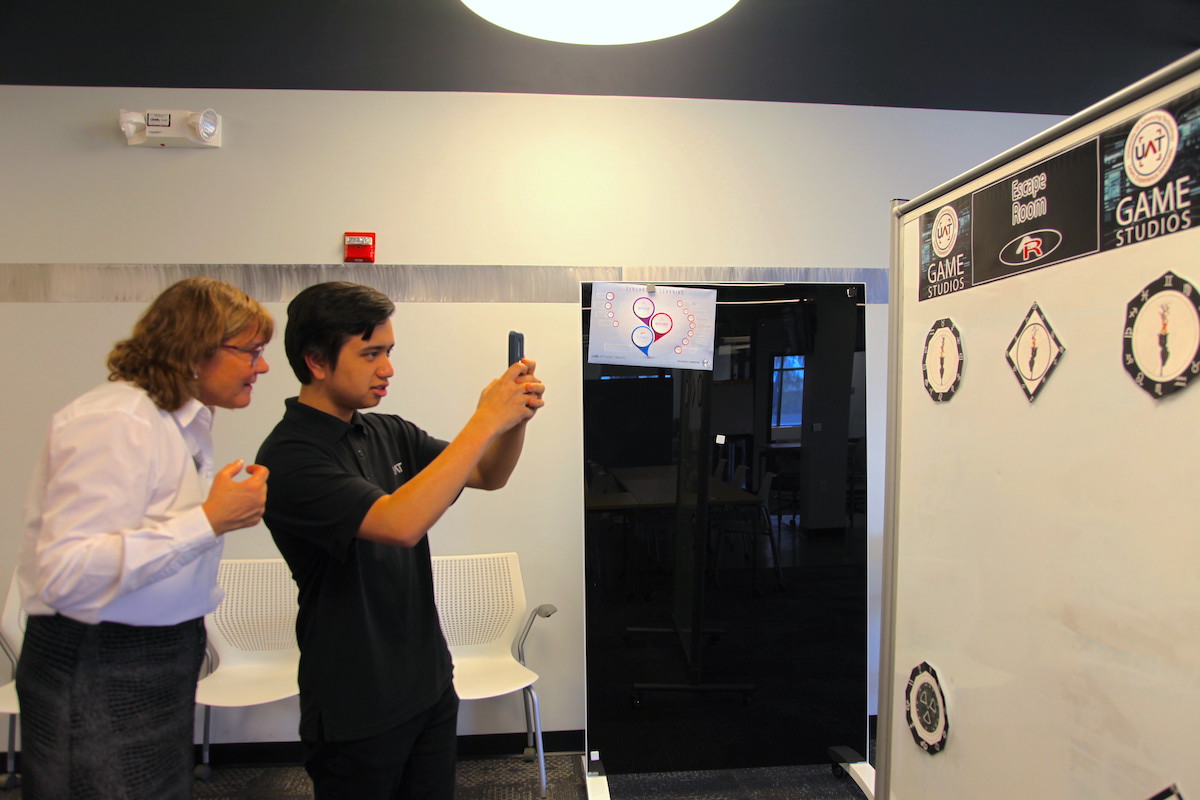
Dr. Jill Coddington previewing an augmented reality app created by a group of UAT students.
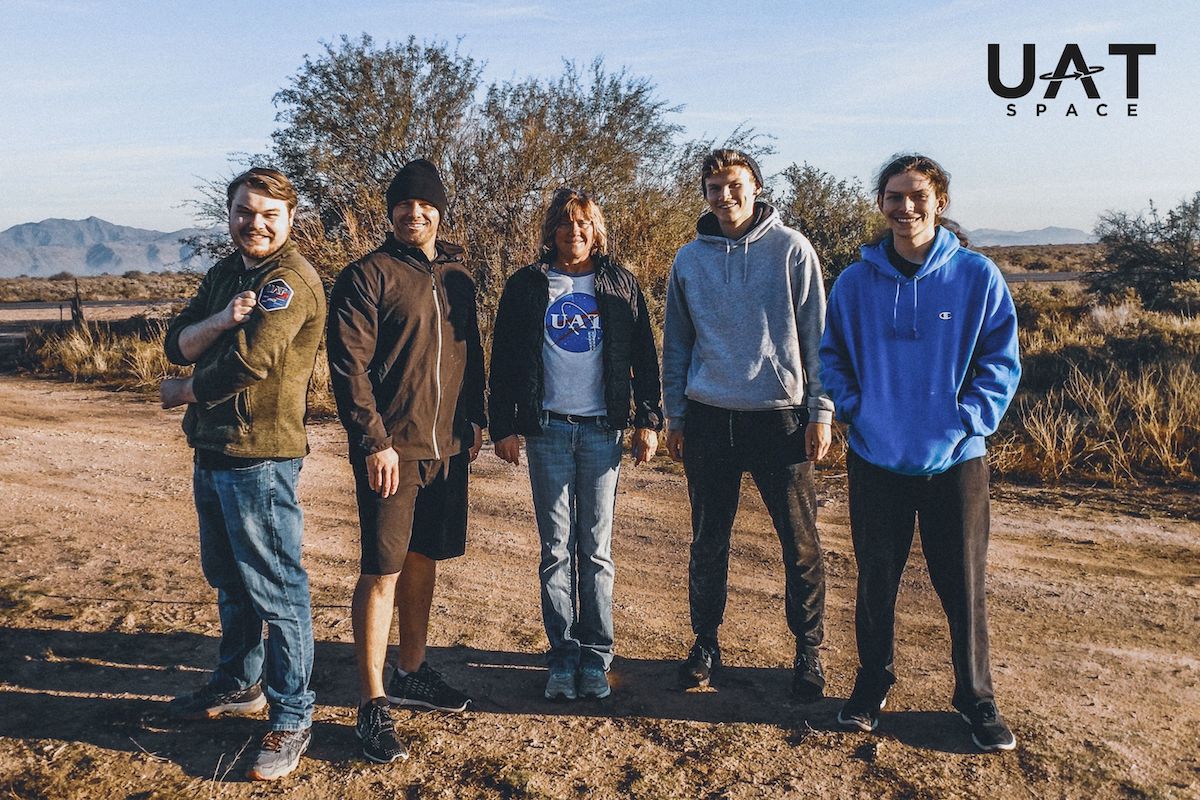
Dr. Jill Coddington (center) with students at one of several UAT Space high-altitude balloon launches.
What can you expect from the Advancing Computer Science degree at UAT?
The first twelve courses focused on this major will include: Beginning Web Design Interfaces and Introduction to Programming. After taking the latter, students will be able to take on other computer science beginner courses such as C# Programming I, Java Programming I, and C/C++ Programming. That's right, as long as you register early before they fill, you can take the interesting courses right away at UAT.
These computer science fundamental courses are the basic building blocks for the rest of the courses in the degree curriculum. Beginning Web Design teaches students how to design and create websites. At the end of the course, the student will have a live, functioning site and a better understanding of how to build a coherent, professional-looking webpage. Introduction to Programming is similar in that it further lays the foundation down for students. Students in this course learn several different programming techniques as well as get the chance to exercise their problem-solving skills in a way that can be transferred to everyday life.
After the introductory courses, students can then branch out and further develop their skills with a minimum of twelve hours of courses, including Java Programming II and C# Programming II. Also available are courses on software engineering and dynamic website building.
The final set of a minimum of twelve credits are designed to synergize the information established by the previous courses in a more advanced fashion. Students will get the opportunity to take courses such as Building Dynamic Websites II, Operating Systems Theory, and Big Data Analytics.
Along with these degree-oriented classes, the University of Advancing Technology requires a minimum of 28 credits in their core classes, which include internships, legal and ethical technological practices, and Student Innovation Projects.
Whoa. That sounds like a lot.
It can feel like a lot at first glance but don't feel discouraged. There's a reason UAT emphasizes that it provides a mentored education. With small class sizes (16:1 student-to-professor ratio) and access to friendly, experienced and knowledgable professors like Dr. Jill Coddington, who are more like mentors, students are supported throughout their journey of earning their degree. Not only that but because UAT understands the nature of technology evolution, if the education a UAT alumnus received is not applicable or outdated, UAT graduates may be eligible to audit courses for life.

Career opportunities for computer science majors are constant and ever-growing. The US Bureau of Labor Statistics predicts employment for computer and mathematical jobs will increase by 13.1% by 2024. It also mentions that as of 2014, computer and mathematic occupations are among the highest paying careers. According to code.org, a Computer Science major can make 40% more in salary compared to other majors.
Also, we've repeatedly seen careers in the computer science, software development and software engineering fields take up many of Glassdoor's Top 50 Best Jobs in the US List since the company started compiling their report.
Dr. Coddington backed the stats. She said, “One value of the Advancing Computer Science degree is the job market. It is predicted that the number of computer scientists needed will increase by more than 20% every year for the next decade. Next, and directly related is salary. Although all-depending and never promised, we've seen some UAT graduates land entry-level positions around $70k with progression for those that perform.”
Moreover, many choose this career path simply because of its vitality and wages. However, there are many other great reasons to consider a degree in Advancing Computer Science. Virtually everything (pun intended) is linked to technology. This means that there is an innumerable quantity of careers to choose from within the field. This gives a graduate the opportunity to hone a specific interest or craft. Whether it be video games, social media, webpage building, the development of new Apps, or other jobs in IT and cybersecurity, this degree program can prepare you for it and more.
Not only does this degree open up a vast world of potential careers, but it also provides a well-balanced load of information beneficial for not only an occupation but one’s life. It guarantees that whoever earns this degree has a comprehensive knowledge of essential skills that can be attractive to employers everywhere, not necessarily just those looking for a computer genius.
Besides financial security and career freedom, an education in advancing computer science can be an investment in a better future for our world. Technology is developing rapidly and with it, the invasion of privacy and rates of cybercrime. An Advancing Computer Science degree from UAT prepares individuals to deal with these current and future problems, creating a secure internet for everyone in a world where cybersecurity is majorly threatened.
Overall, the volume of opportunities and reasons to pursue a degree in Advancing Computer Science are limitless. If you’re looking to be a jack-of-all-trades computer expert with the skills and confidence necessary for advancing technological development, this degree will more than pay for itself. Most importantly, you can graduate with a degree much sooner than other universities or colleges.
UAT is a small, private technology University where courses are offered year-round and full-time students can earn their degree in 2.8 years, which means potentially less tuition costs compared to other post-secondary institutions. At UAT, not only can you graduate faster, but more importantly, enter your career field much sooner, which means more time earning income in the real world.
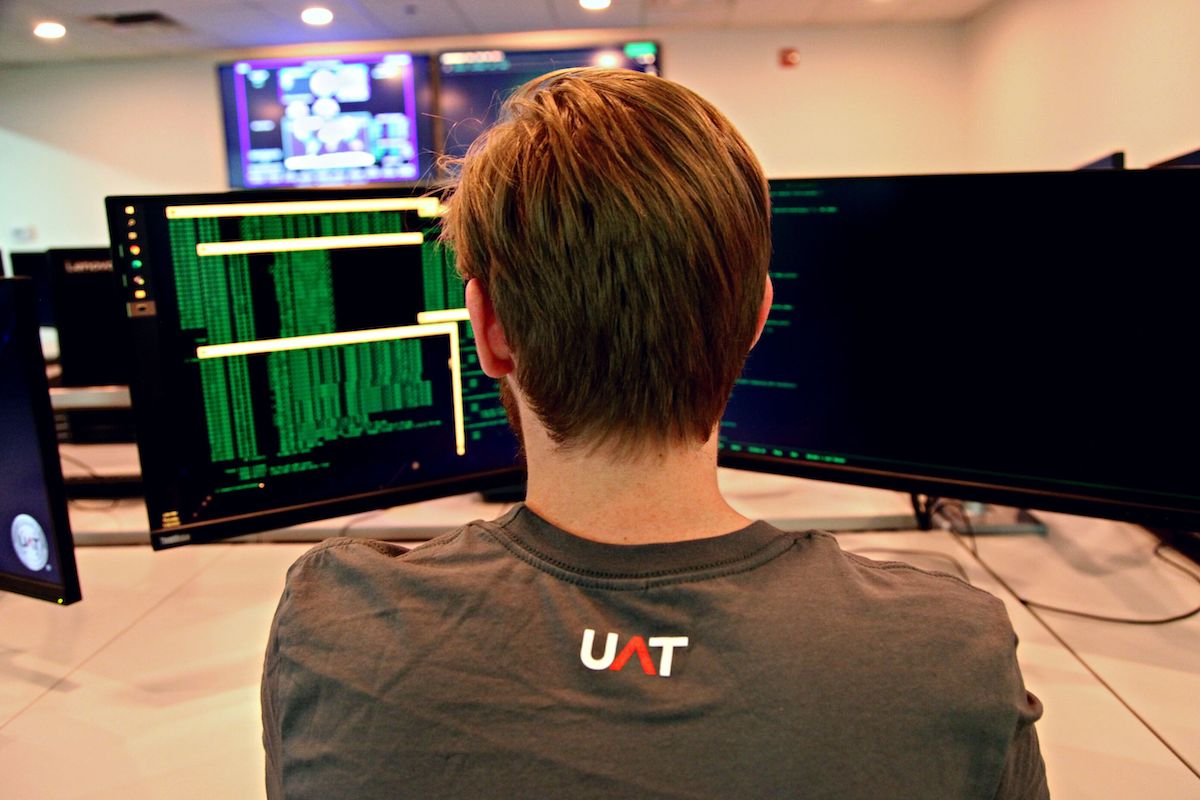
If this all sounds like you're on the right path but you haven't yet requested information or applied for acceptance to UAT, now is the time. Once you've established your interest, UAT is here to help you figure out the rest. Our friendly Admissions and Financial Aid Advisors and other student support teams can support you in the process of figuring out if UAT or an Advancing Computer Science degree is right for you. Take the next steps toward your future earning Tech Respect and reach out today!

Software Engineer. This title has a mysterious ring to it. And it should. Software engineers are the closest things to wizards we have these days.
Engineers, by nature and training, are problem solvers. Some engineers solve problems of a mechanical nature; others of a chemical or electrical nature. But a software engineer solves problems by telling computers—arguably the lowest form of robots we have (next to the toaster)—to solve a given problem for us. And while computers are able to do amazing things, they still need someone to tell them what to do, to whisper in their tiny computer ears. Like a computer whisperer. Someone who can speak the language of the computer to get the computer to behave. And before long, that computer is running through the obstacle course at the Westminster Kennel Club show, sliding down slides, leaping through rings of fire in Evil Knievel suits, and standing in as a stunt double for Tom Cruise. All because one person (or a team, at times) was able to whisper to a beautiful, young Alienware CPU with the latest Intel processor and make digital magic happen.
If this type of compu-wizardry sounds like your cup of soup, then continue reading. Just like there are all types of wizards, there are all types of software engineers. And if you are still reading this article, then one of them is likely right for you.

So, do you like programming languages? Like logic and math? Like challenges, solving problems, and creating solutions? Like not having to worry about ever finding a job again!? A career in the Software Engineering field could be for you and the Advancing Computer Science, Artificial Intelligence, or Data Science degree will help you get there in less than 3 years. But we’re getting ahead of ourselves. First, let’s look at each of these careers to see which one is a good fit for you.
Ranked #8 on Glassdoor's Top 50 Best Jobs in America For 2022
Software Developers (computer programmers) and Software Engineers are those who make and test the applications, algorithms, and frameworks that need protecting. This career is one of the most secure and satisfactory careers in the tech field with a formidable 22% growth outlook over the next ten years, according to the Bureau of Labor Statistics.
These compu-polyglots spend their days in front of a computer, knocking out code like Floyd Mayweather Jr. And yes, I meant compu-polyglot (We just made that up, but you can use it.)
Software Developers will know several computer languages and are typically able to build programs using software development tools while software engineers are specially trained to build software tools from scratch, to make computers think for us, entertain us, or inform us. Basically, anything you can do on a computer, a software developer or software engineer wrote it and a quality assurance analyst checked it over to make sure it did all the right things and none of the wrong things.
It sounds like a broad description, but that’s because it is. There are several specialties that fall under the term “software developer” or "software engineer". For instance, Java Developers generally take on creating and maintaining java applications for startups to go to market and help fulfill customer orders. This position specifically ranked #1 on Glassdoor’s 50 Best Jobs in the US for 2021 list and currently has over 10,000 job openings in the US for this role alone.
Other software positions range in titles like full stack developer, front end developer, back end developer, UI/UX designer, cloud engineer, mobile engineer and many other niche developer or engineer positions that have specific roles on a software development team. Kind of like how some wizards specialize in shape-shifting and others in alchemy. At the end of the day, they can all cast a mana shield to protect their party. You understand.
To become a software developer, you must start with a computer science degree or similar software development degree program. To become a software engineer, you'll want to look for a software engineering-specific program like UAT's master's degree in software engineering. You will learn the necessary algorithms, complex software design, mobile, frameworks, and multiple programming languages required, and based on courses, projects, internships, and more, you can start to determine where you want to specialize in your career.
Learn more about the Software Developer and Software Engineer careers, requirements and more.
Ranked #3 on Glassdoor's 50 Best Jobs in America in 2022
Data Scientists, Data Engineers, and the like are in high demand and will continue to be over the next decade. And, according to Linkedin’s last U.S. Emerging Jobs Report, this relatively new career field has seen a growth of around 35% for both data scientists and data engineers. But what do they do?
Governments and companies take in a massive amount of data. Like the relative amount of empty space in an atom kind of massive—only more so. But what do they do with that data once they have it? Well, they perform their most basic functions with it like billing and payroll and purchasing inventory.
But wouldn’t it be nice to have all that data collected in a meaningful way so that people who aren’t tech-savvy could actually use the data? Well, that’s part of what a data scientist does. Some go a step further and help to analyze the data and make recommendations to the company to optimize performance.
In short, as UAT puts it, a data scientist “transforms data into insights” and offers a whole degree plan engineered around this idea. (Check it out here.)
If you’re wondering what it means to “transform data into insights,” consider here how it’s used in what is being called predictive policing.
This sort of predictive policing is not without controversy and if even the thought of it bothers you, this may still be the career field for you. After all, if you are the one helping to make the predictive models and you are a just-minded person, you won’t be satisfied until the predictive technology is without bias and is a jewel of justice and not a tool of tyranny. You are just the kind of person who free people need to work in this field.
Learn more about the Data Scientist career, requirements, outlook, estimated salary and more.

Ranked #4 on Glassdoor's 50 Best Jobs in America in 2022
For salary, satisfaction, and plentiful opportunities, the DevOps Engineer role (and one of the coolest sounding IT gigs), is expected to grow at a rate of 21% over the next decade according to the U.S. Bureau of Labor Statistics.
Rightfully so. This all-seeing, cross-departmental role is all about collaboration, efficiency, and improving productivity often through the form of implementing automation.
A DevOps Engineer generally works within IT, managing projects with various departments and teams including operations, software, and product development, and implementing better systems and processes along the way. This professional is an engineer by nature, a master coder in multiple programming languages, and has a deep understanding of software development lifecycles and lean, agile, and scrum methodologies.
Being a fairly new philosophy, the DevOps position can have inconsistent role definitions depending on the organization. It's important for anyone venturing down this career path to seek a wide breadth of relevant skills and expertise in IT operations, IT security, and application delivery to boost qualifications.
For starters, a bachelor's degree in Advancing Computer Science and taking specific operations-focused courses from UAT's Business Technology degree program can get you on the right track for the DevOps field. With UAT's open curriculum, you can take courses outside of your major. So, why not take advantage of the opportunity to become uniquely qualified?
Learn more about the DevOps Engineer career, requirements, outlook, estimated salary and more.
{% video_player "embed_player" overrideable=False, type='scriptV4', hide_playlist=True, viral_sharing=False, embed_button=False, autoplay=False, hidden_controls=False, loop=False, muted=False, full_width=False, width='1920', height='1080', player_id='63926231620', style='' %}
Now for one of our personal favorites since we were the first university with an artificial intelligence degree, the Artificial Intelligence Specialist demand has grown 84% annually over the past 6 years according to LinkedIn’s recent Emerging Jobs Report. That is insane growth.
Artificial Intelligence Specialists, like Machine Learning Engineers (ranked #6 on Glassdoor's 50 Best Jobs in America for 2022) will be the ones who help to improve existing AI and create all-new AI. It’s not as spooky as it sounds (though it can be). AI is used in most mainstream gaming, business analytics, and machining operations.
But it can be spooky, too. Like maybe you’ll be the one helping Elon with the appropriate intelligence for his little androids. Or you can help the uber-wizards at Boston Dynamics in creating their animal-themed robots.
Learn more about Artificial Intelligence Specialist and similar careers here.
Surely you’ve heard of Dogecoin? How about Ethereum? If none of those, please tell us if you’ve heard of Bitcoin?
Well, the use of blockchain technology may be popularized there, but it is actually exploding into every market on the planet. Statista estimates spending on Blockchain technology to rise from 6.6 billion in 2021 to around 19 billion by 2024. At its core, it’s about decentralizing information, which kind of sounds wizard-ish. I mean, if the information isn’t centralized, then how can it be anywhere?
Enter the blockchain engineer. They help define protocols for the different blockchain technology, create apps to interface with the blockchain, and find the most effective ways of mining a blockchain.
While few universities offer a standalone degree for blockchain technology, UAT offers a Blockchain module where students learn to code Blockchain applications while studying its advancing trends and working within sandboxes to create prototype solutions. UAT’s Blockchain module can be taken within any of the master’s degree programs. So, while you’re earning your Software Engineering master’s degree, add on Blockchain and step into the world of decentralizing everything.

Master software engineers typically have years of experience as a software engineer, boasting a portfolio of successful projects ... and a master's degree. Not simply satisfied with coding all the livelong day, no, this particular breed of software sorcerers looks at the big picture.
They solve the problems in an over-arching manner, sometimes directing the work of the developers and other engineers, to achieve specific goals. They use all the same languages as the developers, but they also design and lead projects, employ analytics, scaling, and find ways to communicate these big ideas to other departments, members of the team, or to prospective customers.
To get on track to becoming a Master Software Engineer, you'd want to earn your bachelor's degree in Advancing Computer Science and continue on for a master's in Software Engineering. You can achieve both of these together in as little as four years at UAT. In that time, your peers that chose the state school will still likely be working on their undergrad.
At this point, you're probably over debating whether the computer science field is worth it, so it should also be no surprise that a Master of Science degree in Software Engineering will help you go even farther in your career. The added education will potentially earn you qualifications for leadership positions offering higher pay within various organizations and help you stand apart from the competition like the master you are (or soon will be).
Already have your Bachelor’s?
Yes, but it's not in the realm of software development, computer programming, or computer science.
No fret. You can earn your Master’s in Software Engineering from UAT without prior experience.
With UAT’s innovative approach to master’s studies, as a student you will work through four modules, earning four professional certificates along the way. Two of these modules are required for the specific degree program of your choosing, but the additional two can be chosen from all other module options. Want to get a master’s in Software Engineering, but also want to add some Tech Startup expertise to your resume so you can be more qualified for your dream job at your dream company after you graduate? Dooooo it!
And getting there isn’t going to take you 6+ years. It does take commitment, time, effort, and energy, but you can have your master’s in as little as 15 months with UAT.
So, what are you waiting for? The future is waiting, but it needs people like you to help program it. Go be a digital wizard.
Change the world.
{% video_player "embed_player" overrideable=False, type='scriptV4', hide_playlist=True, viral_sharing=False, embed_button=False, autoplay=False, hidden_controls=False, loop=False, muted=False, full_width=False, width='1920', height='1080', player_id='63926254396', style='' %}

On September 25, 2020, nine University of Advancing Technology (UAT) students started development of their own new apps, with less than a week to concept and complete their ideas before presenting to judges and peers on October 2, 2020, via Zoom.

Dr. Jill Coddington, UAT Program Champion for Advancing Computer Science, Robotics, Data Science, and Artificial Intelligence, led the competition. “App-It-Up was a short sprint for mobile development,” she said. “The contest theme was a choice between time or recreation, and the participants had 4 days to develop an app based on those themes.”
Dr. Coddington was very impressed with the results! “In my opinion, 2 of the apps are worthy of publication in the Google Play Store, even with the limited time frame,” she said. “This was such a fantastic way for students to do rapid development and hone their mobile app skills. The event was fast paced, the apps were fun, and there were lots of great results!” 📱
And the App-It-Up Mobile App winners are:
Jacob Dominski for Universal Time Zone
Matt Evans for Daily Tasks
Noel Castillo for NY trivia
Nathan Carr for Modern Art Clock
Watch the students present their apps, plus don’t miss the awards ceremony at the end!
Want to learn Software Engineering?
UAT has several degree programs to choose from!
Start the process now! Fill out our Fast App at https://uatfastapp.com/.
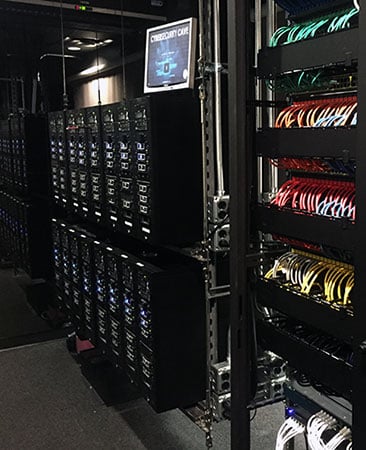
What is network security, and why is it so important? Technology has become such an ingrained part of our society that securing it has become a necessity, but how do you secure a bunch of ones and zeroes? That is where network security comes in.

Security is needed in all parts of life. You need to feel secure in your home, so you have locks on your doors. Museums need to be secured from thieves, so they have security guards and cameras. And with the information age, the very information stored on our computers can be stolen, copied, or destroyed. Preventing this is the essence of cyber security.
When you consider network security, you need to consider every possible facet of what could happen to your data physically and digitally. Your computers need to be in a secure location and only personnel with the proper authorization should be able to access them. Your computers also need to be in a protected network with firewalls and any number of other security techniques.

It is known within the security community that given enough time and resources, any person that is dedicated enough can break through any security. Just look at popular heist movies such as Ocean's Eleven, those people had the time and the resources to break through or get around the security that would have prevented them from achieving their goal. This concept applies to digital information as well. Some hackers are novices and don't pose much of a threat unless you don't have any security. But some hackers are innovative and smart enough to get around higher levels of security.
This doesn't mean that we shouldn't try to secure our belongings, but it does mean that we need to be as prepared as we can for those who would do us harm. We should be proportionally prepared for a digital attack as important as the data we are keeping. Banks need extremely high security, but a website full of flash games doesn't need that same level of protection.
In short, because of the times we live in, and even more so now since most of us are working virtually from home, we need to protect our data. If you want to learn how to secure your network and the networks of companies and businesses, the University of Advancing Technology has the Network Security major just for you.

-Kody Mitchell
keywords: network security, cyber security, information security, security, hackers, hack, firewall, data, information, network, computer, computer security
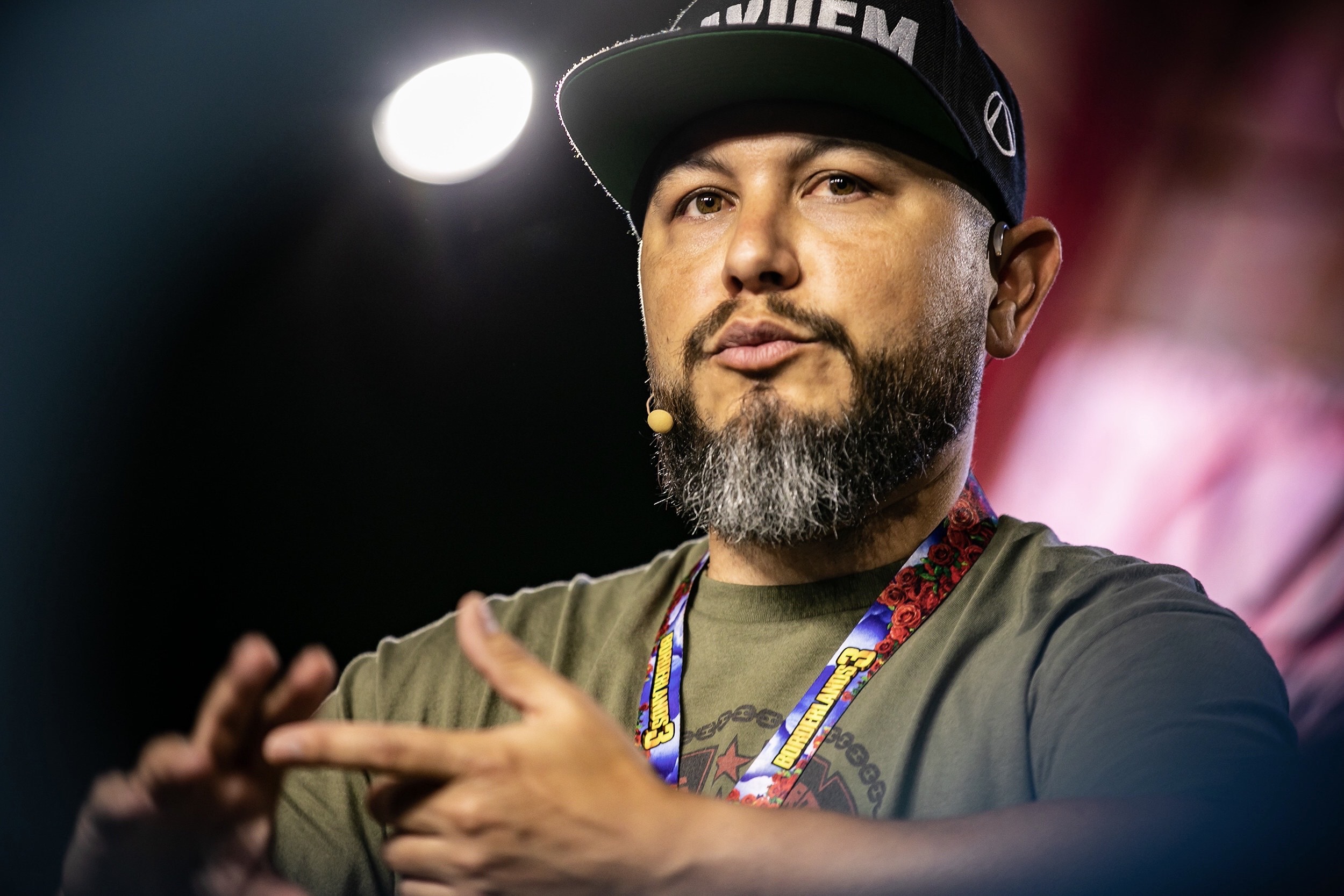
Scott Velasquez
May 2000
For the past 18 years, Scott Velasquez has worked Gearbox Software in Frisco, TX, where he resides as a Lead Programmer. He’s had the pleasure of working on a number of different titles such as Counter-Strike, Borderlands, Brothers and Arms, Halo and many others. Most recently, he put his talents forward as the Online & Social Product Owner for Borderlands 3 which released on PS4, PC and Xbox One. Scott wore many hats on this project ranging from project manager, designer, programmer and a smidgen of business development. He was involved with the ECHOcast Twitch extension, vault hunter profiles, photo mode, player pinging and most elements relating to online and local player interactions.
Scott believes technology is important because it can scale to reach a large number of users to solve many types of problems. Scott likes tackling different problems each day and is a lifelong learner. Technology is always evolving and keeps him on his toes!
When Scott was researching colleges in 1996, he noticed that most colleges were teaching old languages like COBOL, FORTRAN, etc. As an avid reader of PC Gamer, Scott came across a UAT ad advertising courses in languages and techniques specific to game development. He applied immediately after visiting the school.
Moving from a small town in West Texas to Arizona, he appreciated the next gen UAT facilities (he was using 486DX and dial-up back home).
UAT’s curriculum and professors challenged Scott in the best way possible. He was extremely impressed that the faculty had game industry experience and unique industry experience, such as his ex-NASA scientist Calculus professor. Scott enjoyed the way UAT professors taught, because they did a great job of explaining not only the how, but the why. Working full-time at Compuware and later Rhino Internet, Scott attended school in the evenings.
While at UAT, Scott made many great friends, some of which he is still friends with to this day. Pushing each other to learn more, Scott and his classmates had fun trying to outdo each other on assignments.
Scott encourages UAT students to meet other students and staff and put themselves out there. UAT is a great place to foster connections—you never know who you’ll meet—they might become a co-worker, friend or someone who will help down the road. Scott urges students to dig deeper and go above and beyond what the professor is asking on assignments. He also recommends joining or creating a group and building projects that can be highlighted and shared with your resume.
Scott advises students to find companies in the area where you can shadow or intern. “Getting a better understanding of the role you want to have someday will help you start preparing sooner rather than later. Attend some game development conferences and meetups,” recommends Scott, and finally, “Enjoy yourself, college will be something you look back on fondly when you get old like me.”
Scott feels that UAT absolutely prepared him for his career. Before UAT and just for the heck of it, he applied at 3drealms (he was a huge Duke Nukem 3D fan at the time). He knew it was a long shot—the programming he taught himself and learned in junior college didn't involve 3D. As expected, 3drealms turned him down due to his lack of 3D experience.
UAT taught Scott many things about programming, 3D development, data storage and manipulation, mathematics, web development and working with others. The greatest thing UAT taught Scott was how to logically approach problems and formulate solutions.
While working full-time and attending UAT, he made time to help a friend create a 3D engine in Java, soon after Java added 3D support. They were both programmers, so the 3D models were created by hand in notepad! Scott created a DirectX/OpenGL engine in C++ with networking support and built demo apps like a multiplayer 3D checkers game, a chat client, etc. Later, when Half-life and Unreal Tournament came out, he started learning how those engines worked and built mods.
After graduation, Scott landed a job at Cinematix Studios in Tempe. There, he could immediately apply programming concepts and Calculus while creating an audio engine and complex camera systems for two platformer games on PS2.
Scott encourages students to contact him with any questions about UAT or if they need advice as they prepare to enter the game industry (@thereal_scottv on Twitter).
Meet other UAT alum!


The US Army has now deemed that using the Chinese owned app TikTok, which the US Army was using it to recruit and promote their own branch of service, is a potential security risk that needs to be banned.
Army spokesperson Lt. Col. Robin Ochoa told Military.com, "It is considered a cyber threat… We do not allow it on government phones."
It's a no-brainer that China has raised a lot of security concerns since they don't have to abide by U.S. laws on data privacy and collection and consumers who request their data. So having a Chinese company collecting vast quantities of video footage and location data and IP addresses and other information from military personnel? Probably not the best for keeping things under-wraps from foreign espionage.
That being said, this is not the first app to be banned. In 2016, the U.S. military banned Pokemon GO due to it being too distracting. Banning TikTok as well is quite a reasonable response.
This is not, however, the first time TikTok has raised security concerns. U.S. senators wrote a letter to the U.S. Director of National Intelligence requesting a review of the app. In the letter, they stated "Security experts have voiced concerns that China’s vague patchwork of intelligence, national security, and cybersecurity laws compel Chinese companies to support and cooperate with intelligence work controlled by the Chinese Communist Party."
As well, it's not just the Army who has it banned, but In December 2019 the U.S. Navy also prohibited its personnel from using TikTok on government-issued phones. Violating the restriction threatened the users to face a block from the Navy-Marine Corps Intranet.
I feel bad for those service members who wasted time dancing in front of their phones 15 times to try and get it right. So don't go dancing in front of the boots recruiters.
UAT has been designated a military friendly school and offers degrees in Network Security, Cyber Security, Technology Forensics and Network Engineering.
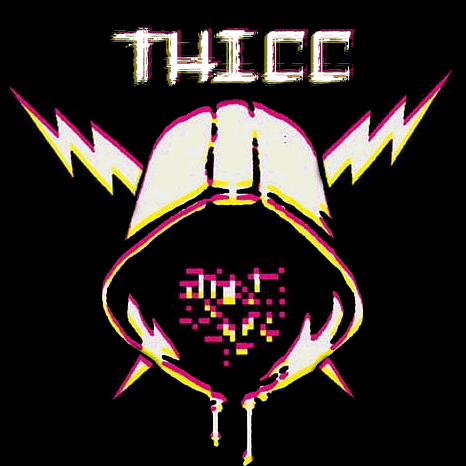

The Network Security club here has been named THICC which stands for short The Hacking Informational Cyber Crew a clever name for the gang in the Network Security Class or Cave.
THICC first started out with the seniors that were at first freshman and created the club as they stayed late at school and figured why not make it into a club. The club was designed for students who just hang out in the cave and have a fun time. THICC do participate in a lot of different events and competitions such as CTFs (Capture the Flag). The club also does many different tutorials and sessions to educate the members and teach us different things such as a Linux tutorial, PicoCTF, and watch some videos on different things like Stuxnet.
THICC plans with all members on Discord! We have new students add the server to their Discord accounts and that’s where all information is housed about the club and Network Security Major events. There is a ranking system in THICC that goes from Members to Non-Skid to Admin then finally Council. It’s all measured on how often you’re in the Cave so if you become close to the Council then they have decided to include you in their ranks as long you have the passion.
So far THICC is averaging about 30 members every Friday for the meetings and events. Every semester the numbers change from a full house to just a handful of members.
THICC will still be around after I leave, and I have 2 years ahead of me. Future Network Security students I do recommend attending THICC and using the Cave as a place to work as it’s a valuable resource for new students. Many of the students who are in this club are very laid back and enjoy memes and just talking about what's in their mind. Slowly but surely I plan to be more attached to the club when I have more time to participate.
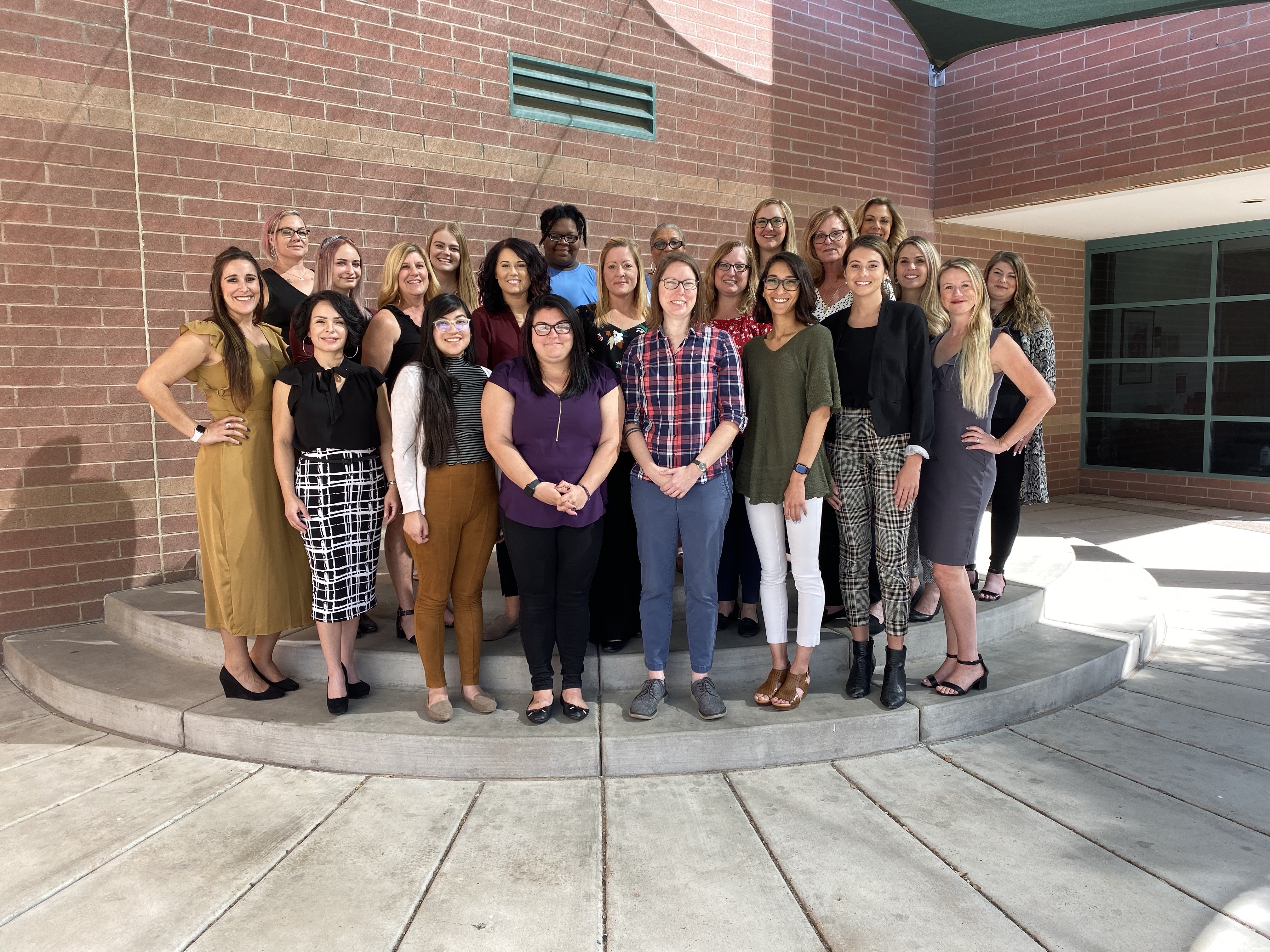
by Taylor Nakakihara
On Tuesday, October 8th we celebrate the achievements of women in STEM on Ada Lovelace Day. UAT takes pride in our support of girls and women in tech. We collaborate with the Girl Scouts of Cactus-Pine and the Boys and Girls Club on the development of STEM curricula for their organizations. It is our pleasure to continually support the events and efforts of Girls in Tech, Girls Who Code, Girls Rule Foundation, ISAACA She Leads Tech, Women Techmakers, Phoenix Women IT Unite, and more.
Held on the second Tuesday of October each year, Ada Lovelace Day is an international celebration highlighting the achievements of women in STEM and aiming to increase the profile of women in STEM, leading to the creation of new role models who will help lead more girls into STEM careers and support women already working in the field.
Who is Ada Lovelace?
Born in London, England, in 1815, Ada Lovelace was born to Romantic poet Lord Byron and Anne Isabelle Milbanke. Her mother, who preferred that her daughter be tutored in math and music at an early age, desired a more stable life for her daughter than that held by her poet father. Anne Milbanke, also known as Lady Byron, was also a mathematician herself.
By 17, Lovelace had begun correspondence with inventor and Cambridge Professor Charles Babbage on topics such as math and logic. This connection would prove incredibly valuable for Babbage, who in 1842 had found international support for his new project, the Analytical Engine. However, this support came in the form of a memoir from Italian mathematician Louis Menebrea , written in French. Initially, Lovelace was brought on by Babbage to simply translate these notes on the Analytical Engine.
Through her work as a self-identified “Analyst and Metaphysician”, Lovelace’s translation and accompanying notes over the course of 9 months would earn her enduring recognition by the tech community. Despite Babbage’s achievements with the Analytical Engine, he had failed to produce a compete program for the machine. Lovelace was able to write a computer program to prompt the Analytical Engine to generate Bernoulli Numbers, thus successfully publishing the first, most complete, and most elaborate program of its kind. Furthermore, Lovelace was the first to explain the creative potential of the Analytical Engine through the use of the right programming to expand the machine’s capabilities well outside of its ability to calculate numbers. Lovelace is a herald of the future of the general-purpose computer, and noted that the Analytical Engine was suited for “developing and tabulating any function whatever... the engine is the material expression of any indefinite function of any degree of generality and complexity.”
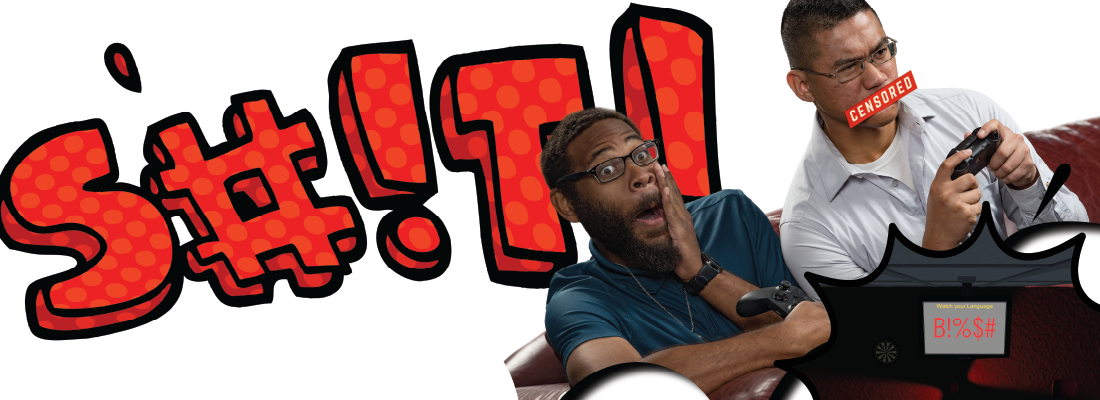
Playing online video games is like running through a minefield of curse words. Watch Your Language is a tool kit trying to make the gaming experience more family friendly.
This Student Innovation Project (SIP), created by duo Rocky Vargas and Michael Shepherd, monitors what players are saying and flags inappropriate words. Rocky explains, “Our innovation claim is that gameplay is intensified by turning to foul language gamers use into a mechanic for punishment.”
There isn’t anything for gaming that uses speech recognition this way. If Watch Your Language detects vulgar words, alarms sound and the monitor will display the word. This mechanic is meant to monitor in real-time and can be universally used because there is a coded element that can be written for any word.
Because of the code, this technology can expand into more than just the gaming industry. Software and other technologies written in code can apply Watch Your Language if it’s compatible with a microphone.
Rocky wrote the original code to detect specific words and activated the streaming portion of this SIP. Michael polished the code and hooked it all up.
Do you want to drive the future of games? Check out UAT’s Game Programming degree.
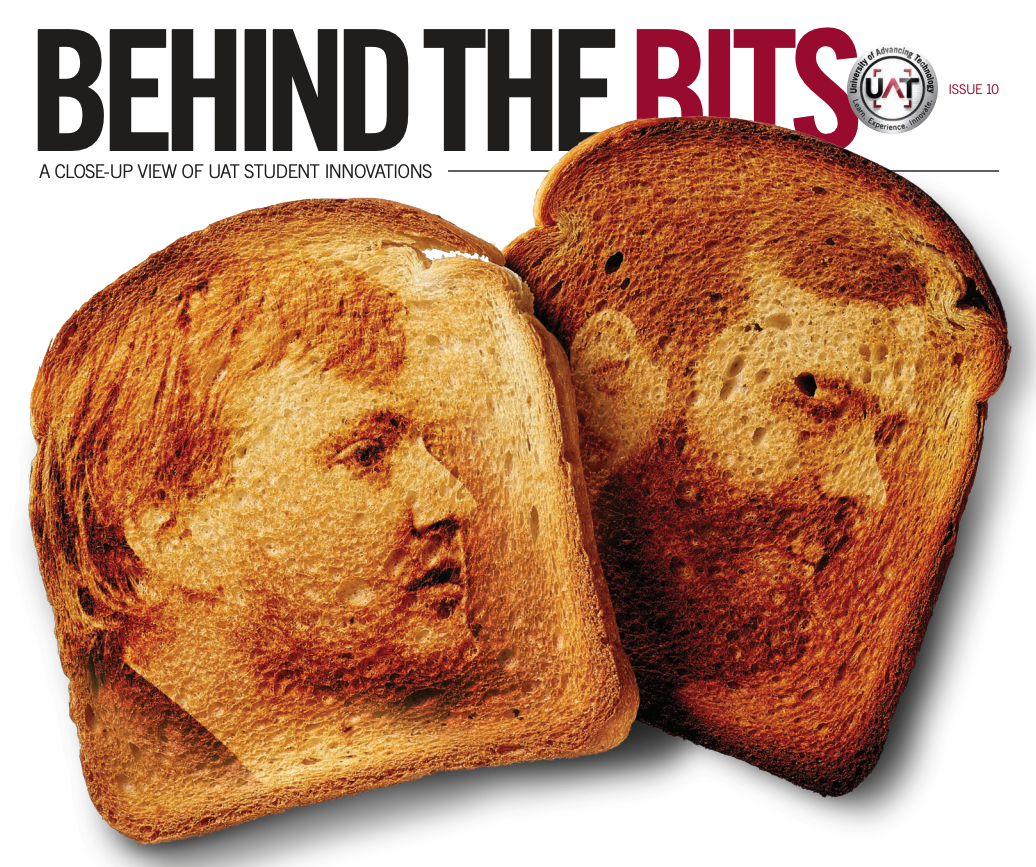
After experiencing the lengthy task of adding incoming, first-year students to a database by hand, Adam Morris took his experience working in the Cyber Warfare Range to improve administrative work.
Knowing there was a better way to complete this work, Adam commissioned his friend Kelvin Ashton to create a program script tool kit as their Student Innovation Project (SIP). Thus, Toasty Sec, named from a flying toaster screensaver that coincided with late night hunger, was created as a tool for security/system administrators.
Features like adding and deleting users, hashing files and port scanners were created through PowerShell. Improvements via Toasty Sec includes the ability to access the user’s hardware information.
A hash is a unique identifier found on every file. If the hash has changed, the file has been modified. When it comes to cyber security, a user wants to know why a file has been modified. This is where Toasty Sec comes in. This tool kit gives the user the ability to scan the entire disk in a few minutes and hash everything found within the file.
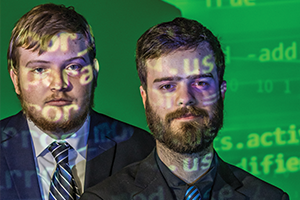 Port scanners are another important part of cyber security. Ports connect to everything on a computer. Your device may experience issues if an unwanted port is open. To keep your device secure, Toasty Sec catches and identifies which ports are open. Toasty Sec even detects SQL injections, the most common type of web-based attack.
Port scanners are another important part of cyber security. Ports connect to everything on a computer. Your device may experience issues if an unwanted port is open. To keep your device secure, Toasty Sec catches and identifies which ports are open. Toasty Sec even detects SQL injections, the most common type of web-based attack.
Both students are graduating with a BS in Network Security and Technology Forensics, and Adam is also studying Network Engineering. Kelvin states, “It’s one project that we based around all of our degrees.”
Before their SIP, neither UAT student knew how to use PowerShell. After taking a scripting class to bring their understanding of basic programming structure up to par, they learned that the true challenge came with learning the different programming languages. Kelvin figured out how to transform one language to another through its methodologies by using object-oriented programming. This was the game changer for their SIP.
Learn more about UAT’s Cyber Security degrees.
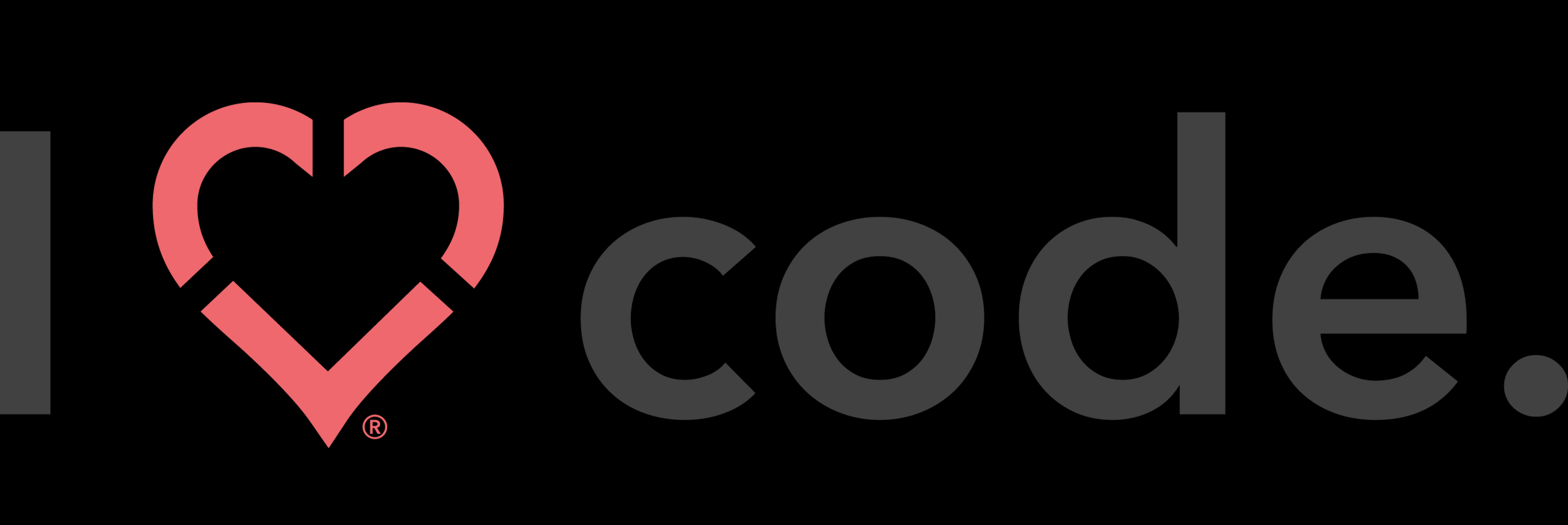
The University of Advancing Technology is gearing up to host another CodeDay, a worldwide, 24-hour event that brings student programmers, artists, designers, musicians, actors and learners together to build apps and games. The fun begins at noon on May 25th and ends at noon on the 26th.
Students of all skill levels are welcome. CodeDay hosts workshops and connects students with mentors to help them bring their ideas to life.
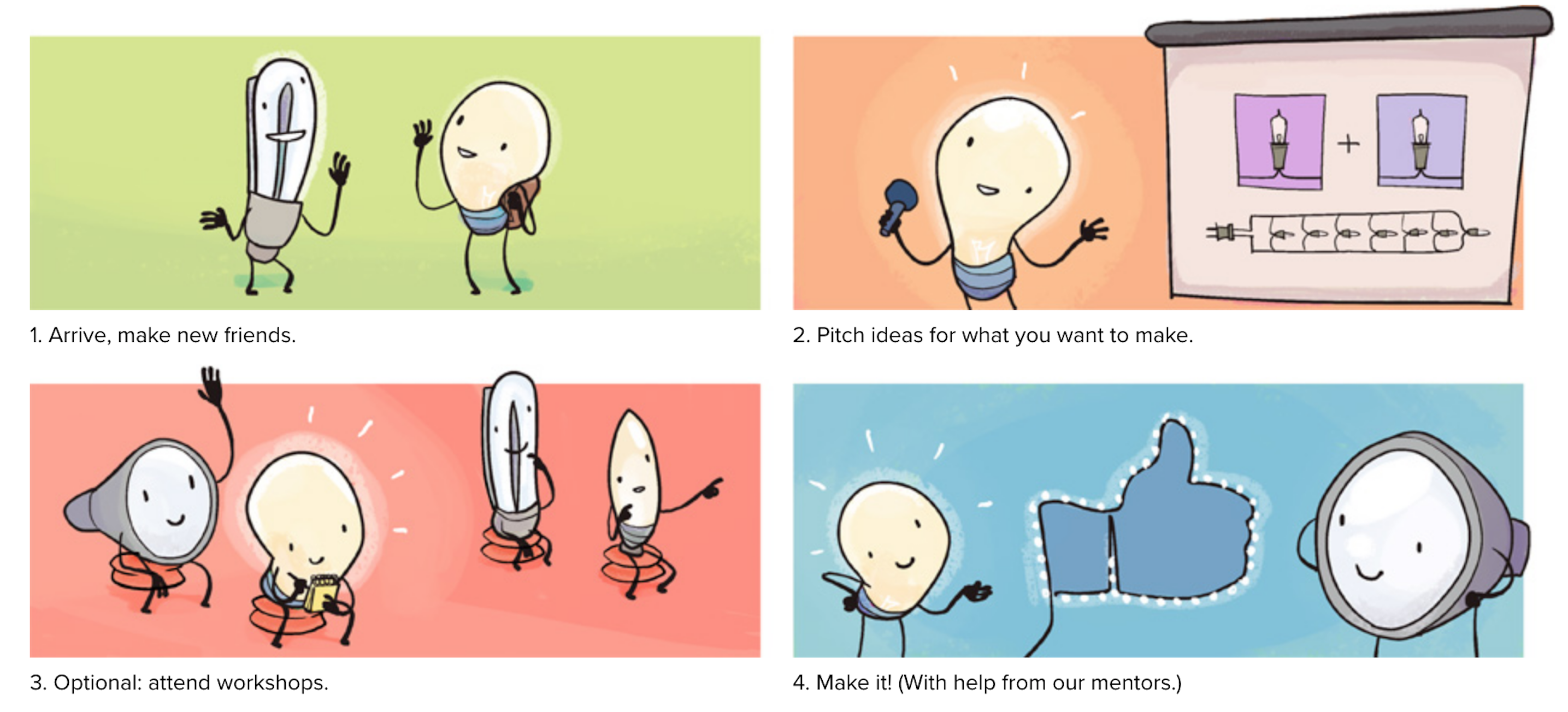
Why host CodeDay at UAT? "UAT's mission is aligned with CodeDay's mission: to give the next generation of technical and creative minds the opportunity to hone their skills, learn something new, and apply it to a real project," said Caitlin Derr, CodeDay Phoenix organizer and InfoArmor security analyst.
Do you want to help students fall in love with coding? Sign up as a volunteer today!
"Professionals have the opportunity to inspire the next generation of creators. You can take an idea and break it down into steps the team can follow to make it a reality. Share your skills building and designing, writing code, testing and debugging, and most important: problem-solving," Caitlin said.
Are you ready to take your coding skills to the next level and prepare for a future-proof career as a programmer? Check out UAT's Advancing Computer Science degree.